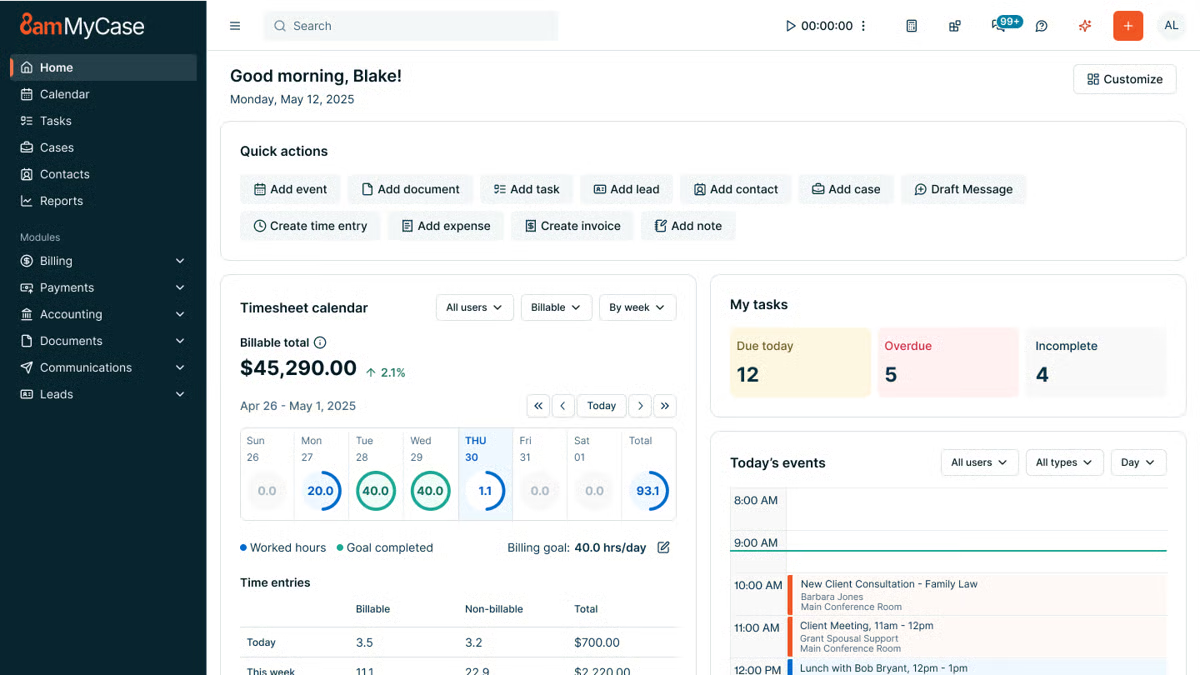11 Best Legal Tech Companies of 2026
11 Best Legal Tech Companies of 2026
Legal work today comes with growing expectations around speed, accuracy, and cost, while many of the tasks that consume the most time still rely on manual effort and repeatable processes.
As firms handle larger volumes of discovery, manage more complex matters, and respond to clients who expect faster turnaround, technology has become part of the everyday reality of legal practice.
The challenge is no longer finding legal tech, but choosing tools that actually make work easier once they are part of a firm’s workflow.
In this article, we’ve compiled a list of the 11 legal tech companies worth attention in 2026, each recognized for helping legal teams work more efficiently, stay consistent, and spend more time on substantive legal work.
1. Briefpoint.ai
Briefpoint is a litigation-focused legal tech company built to take the most time-consuming parts of written discovery off your plate: discovery document preparation.
Drafting discovery responses, mapping productions, and managing Bates citations often eat up hours of attorney and paralegal time, even though much of the work follows repeatable patterns. And that’s just one part of the tedious discovery process.
Briefpoint addresses that problem with purpose-built automation designed specifically for real-world litigation workflows.
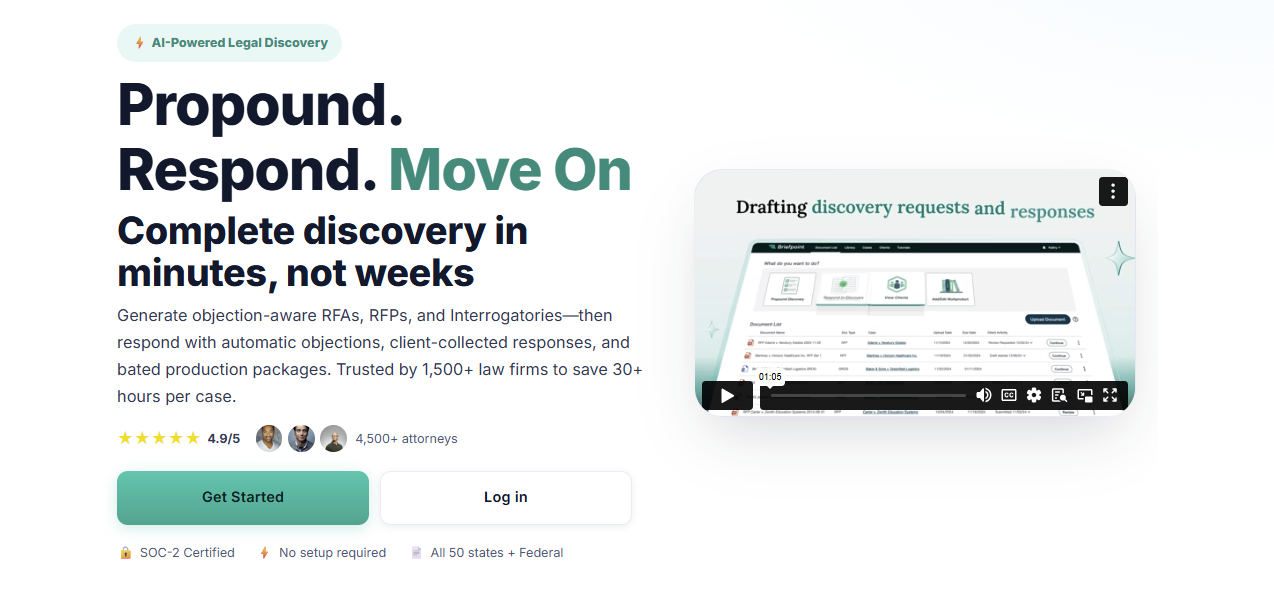
The platform includes features like Autodoc, which helps teams move from raw productions and discovery requests to cited, court-ready responses far faster than traditional manual review.
And with Briefpoint’s generative AI, legal teams can draft discovery response documents in minutes. These include, but are not limited to:
- Requests for admission
- Requests for production
- Interrogatories
Key Features
- Automated discovery drafting: Generates objection-aware requests for admission, requests for production, and interrogatories based on complaints and case details.
- Response drafting with built-in objections: Pre-fills consistent objections and response structures that firms can customize across matters and practice areas.
- Client response collection (Briefpoint Bridge): Sends plain-English questions to clients, collects answers securely, and inserts them directly into Word-ready discovery drafts.
- Autodoc production automation: Turns productions and case files into Bates-cited discovery responses and ready-to-serve production packages with page-level citations.
- Microsoft Word–first output: Produces fully captioned, editable Word documents for requests, responses, and productions.
- Firm-wide consistency controls: Helps standardize objections and drafting practices across teams and offices.
- Security and compliance: SOC 2 Type II certified with safeguards designed to protect confidential work product.
Briefpoint saves legal professionals thousands of dollars every year. More importantly, lawyers and paralegals can spend the extra time on more impactful and engaging work.
2. Clio
Clio has long been the answer for law firms and legal professionals looking for a simple yet effective practice management system.
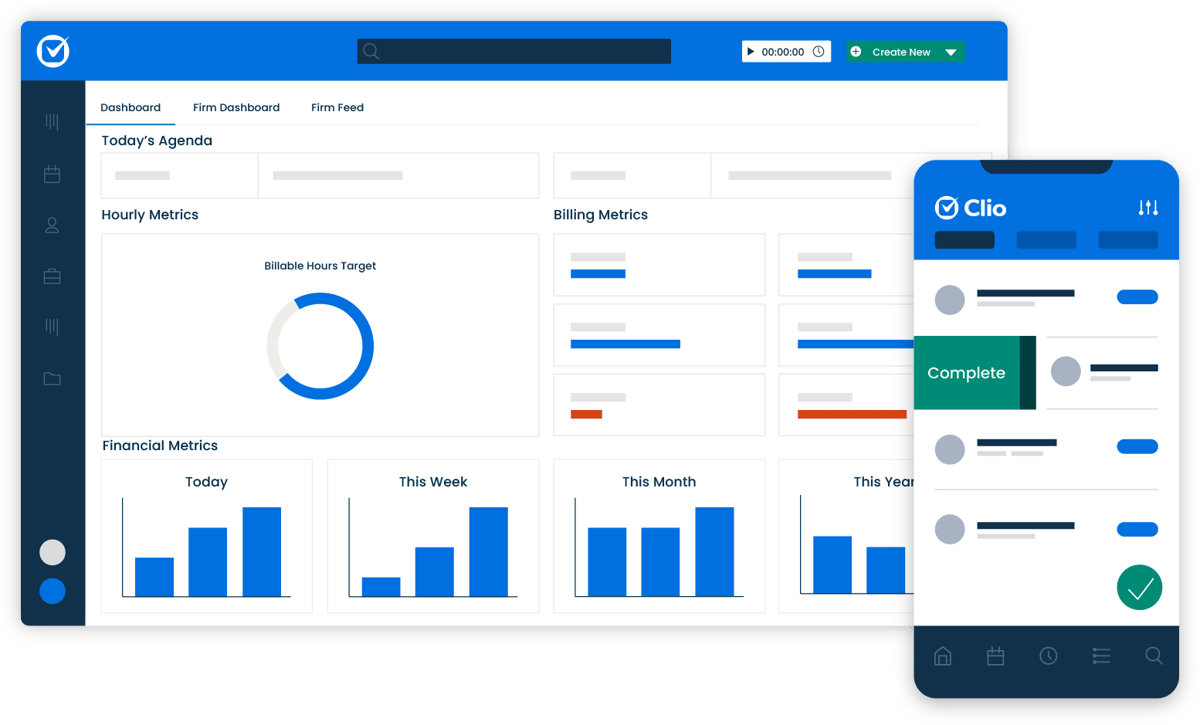
Source: G2
Its comprehensive suite is remarkably user-friendly and accessible to a broad range of professionals, regardless of their technical expertise.
As a cloud-based solution, Clio also offers the flexibility required in today’s legal environment and allows work to be conducted from virtually anywhere. This adaptability is especially valuable given the increasing shift towards remote and flexible working arrangements.
Key Features
- Case management: Organizes client matters, documents, and communications in one centralized platform.
- Time tracking & billing: Tracks billable hours and generates invoices. Also, the platform integrates directly with payment processing tools.
- Document management: Stores, organizes, and shares legal documents securely with version control.
- Client intake & CRM: Streamlines client onboarding with customizable intake forms and contact management.
- Task and workflow automation: Automates routine legal workflows to improve efficiency and reduce administrative tasks.
- Secure communication: Provides encrypted messaging and client portals for confidential interactions.
- Integrations & API access: Connects with legal tech tools like QuickBooks, Microsoft 365, and Zoom.
3. Everlaw
Everlaw is a global leader in advanced discovery and litigation support solutions.
Its platform is known for merging cutting-edge technology with an intuitive design to manage the complexities of legal document analysis and case preparation efficiently.
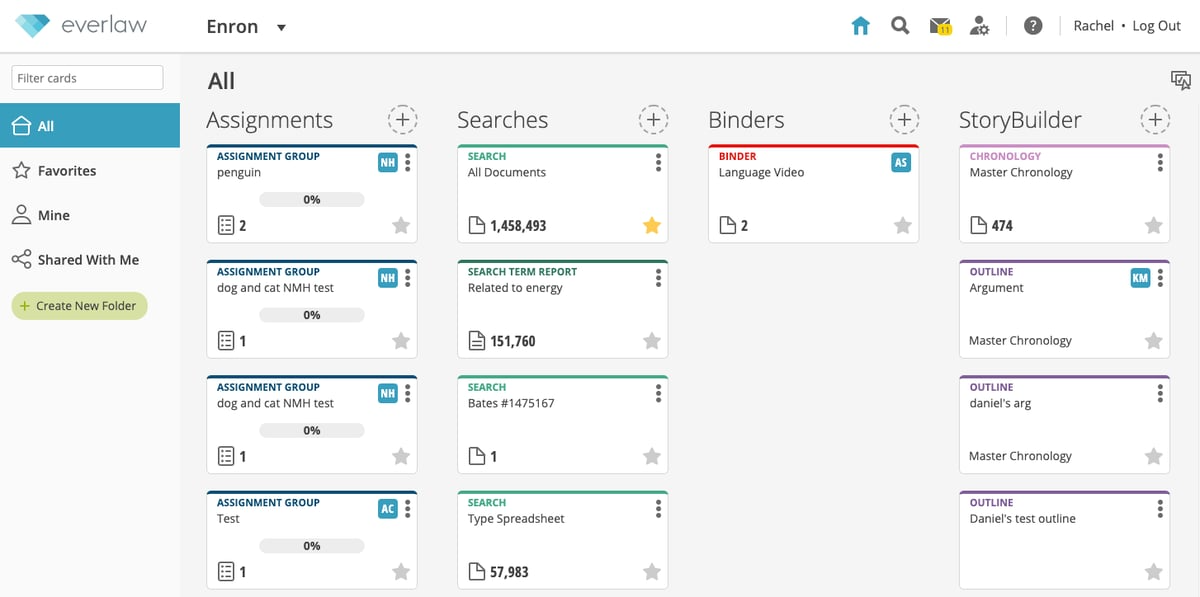
Source: G2
What’s also great about Everlaw is how it champions team collaboration. The platform includes tools for annotation, tagging, and sharing documents, which allows team members to work together regardless of their physical location.
Key Features
- Predictive coding: Uses machine learning to prioritize and categorize documents, speeding up the review process.
- AI-powered document review: Automates document analysis, which helps legal teams quickly identify relevant information.
- Advanced search and filtering: Offers powerful search capabilities with Boolean operators and AI-driven suggestions.
- Redaction and annotation tools: Allow users to highlight, redact, and comment on key information directly within documents.
- Case timeline visualization: Helps legal teams track case progress and connect key events through interactive timelines.
- Automated transcription: Converts audio and video files into searchable text for faster review.
4. LawVu
LawVu combines multiple aspects of legal operations into one convenient platform. This approach is meant to address the specific needs of in-house corporate legal departments and improve the efficiency, collaboration, and overall management of legal matters.
Source: G2
Plus, LawVu’s platform includes advanced analytics and reporting capabilities, which allow legal services to get a clear grasp of their operations, assess performance, and make data-driven decisions to improve their services.
Key Features
- Matter management: Centralizes all legal matters, documents, and communications in one platform.
- Contract lifecycle management: Tracks contracts from drafting to execution with automated workflows.
- Spend management: Monitors legal expenses, invoices, and budgets to control costs.
- Knowledge management: Stores and organizes legal documents, templates, and historical case data.
- Task & workflow automation: Streamlines legal processes with automated task assignments and approvals.
- Collaboration tools: Enable secure communication and collaboration between in-house teams and external counsel.
5. LeanLaw
LeanLaw Billing Software is a smart solution for smaller and mid-sized law firms looking to mesh their legal practice needs with solid accounting.
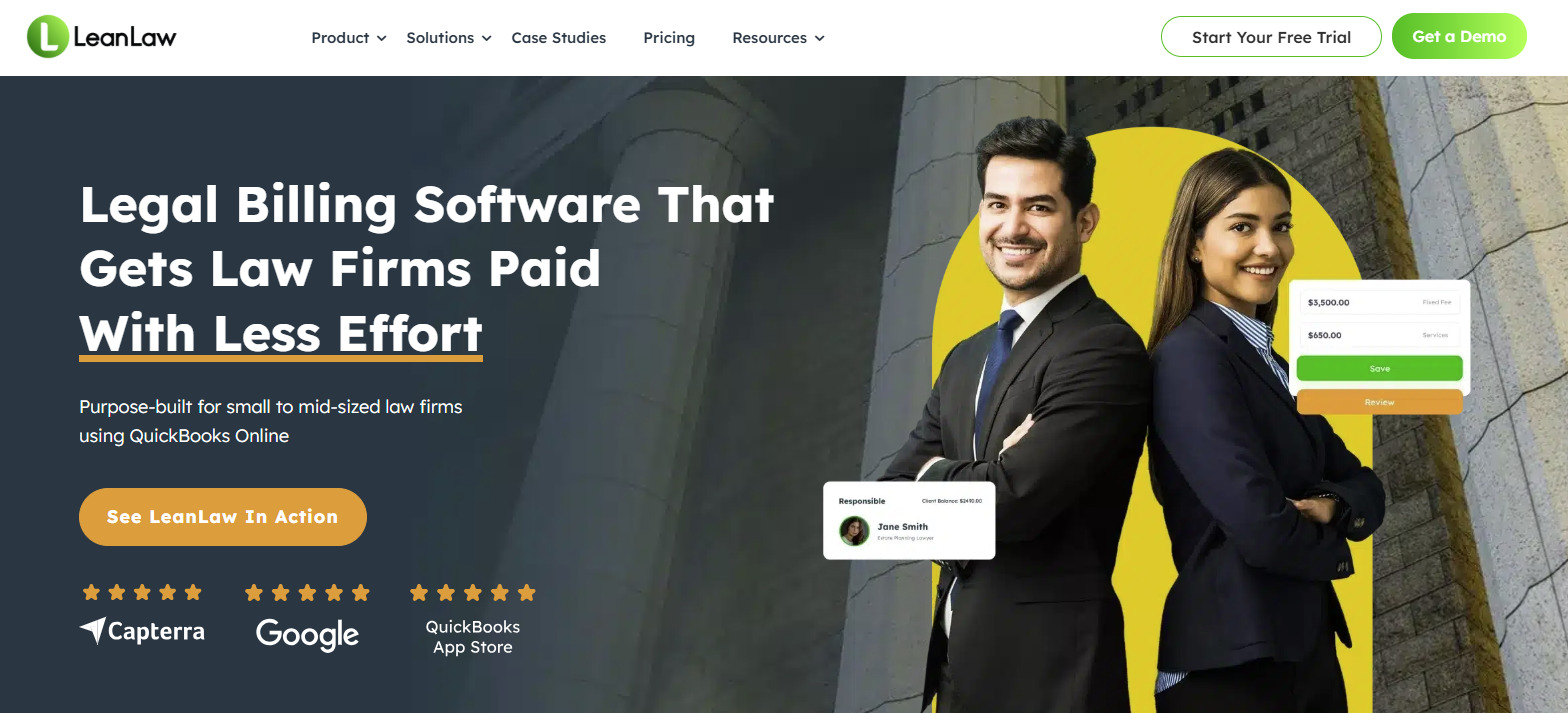
Source: LeanLaw.com
By teaming up with QuickBooks Online, LeanLaw taps into powerful accounting tools and makes the whole financial side of running a law firm (from keeping track of billable hours to keeping an eye on the firm’s finances) a lot smoother and more straightforward.
LeanLaw also offers a package for organizing client details and internal resources, so everything you need is just a few clicks away.
Key Features
- Time tracking: Tracks billable hours with real-time timers and manual entry options to help firms in the legal profession meet growing demand without losing billable time.
- Automated legal billing & invoicing: Generates LEDES-compliant invoices and integrates with QuickBooks for accurate, consistent billing.
- Trust accounting: Manages client trust accounts with built-in compliance safeguards aligned with common accounting requirements.
- Expense tracking: Logs case-related expenses and links them directly to client invoices.
- Revenue & compensation reports: Provides visibility into firm profitability and attorney compensation as workloads increase across the legal profession.
- Matter management: Organizes cases, documents, and client information in one centralized system.
6. Smokeball
Smokeball is legal practice management software geared specifically towards small law firms and solo practitioners. It focuses on streamlining repetitive legal processes, which can reduce the time lawyers spend on administrative work.

Source: G2
Billing and time tracking are other areas where Smokeball excels. It automatically tracks time spent on each task and integrates it with its billing system, simplifying the invoicing process and ensuring that no billable hour goes unrecorded.
Key Features
- Case and matter management: Centralizes case files, client communications, and documents in one platform.
- Document automation: Generates legal documents quickly using customizable templates and client data.
- Task and workflow automation: Streamlines legal workflows with automated task assignments and reminders.
- Firm insights & reporting: Provides real-time analytics on firm performance, revenue, and law firm productivity.
- Secure client communication: Offers a built-in client portal for messaging and document sharing.
7. Ironclad
Ironclad is a complete and scalable solution for teams drowning in contracts and looking for a better way to get things done.
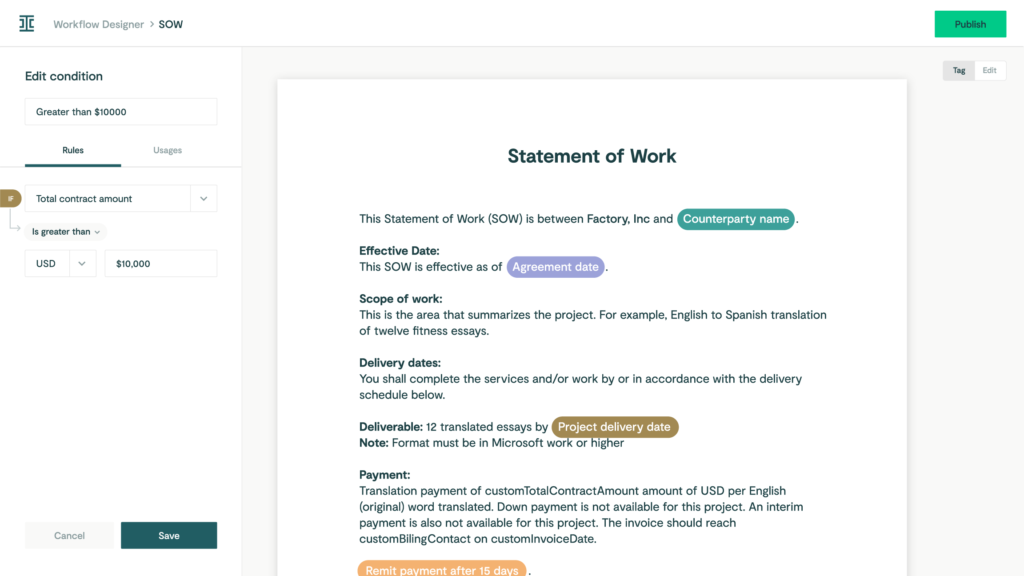
Source: G2
The contract management tool automates the creation, execution, and management of contracts. In addition, this tool can integrate with other tools you’re already using.
Its integration capabilities make sure that contract management becomes a cohesive part of the broader business ecosystem and leads to smoother workflows across departments.
Key Features
- AI-powered contract review: Uses AI to analyze contracts, identify risks, and suggest edits.
- Automated contract generation: Creates contracts using templates and pre-approved clause libraries.
- E-signature integration: Integrates with DocuSign and other e-signature platforms for seamless contract execution.
- Real-time collaboration: Allows legal, sales, and procurement teams to collaborate on contracts within the platform.
- Contract repository & search: Stores all contracts in a secure, searchable database with advanced filtering.
- Compliance & audit trails: Tracks all contract changes and approvals for compliance and reporting.
8. MyCase
MyCase is a legal practice management software that simplifies legal workflows and keeps them running smoothly. It tackles everything from case management and client communications to billing and time tracking into one neat platform.
Source: G2
This means lawyers can spend less time handling different tools and more time focusing on their clients’ needs. With MyCase, everything you need to run your law practice is right there in one easy-to-use interface.
MyCase is also great when it comes to keeping clients in the loop. It offers secure messaging, updates on case progress, and easy online payment options, which help law firms improve their client relationships.
Key Features
- Case management: Organizes case details, deadlines, and documents in a centralized system.
- Document automation: Creates, stores, and manages legal documents with customizable templates.
- Time tracking and billing: Logs billable hours, generates invoices, and integrates with online payment processing.
- Secure client messaging: Provides a built-in client portal for encrypted communication and case updates.
- Calendar and task management: Schedules meetings, tracks deadlines, and assigns tasks to team members.
- Online payment processing: Allows clients to pay invoices easily through credit cards or ACH transfers.
- Reporting and analytics: Offers insights into firm performance, revenue, and case progress.
- Mobile access: Enables lawyers to manage cases and communicate with clients on the go.
9. CoCounsel
CoCounsel, powered by Casetext, is another innovative legal tech tool. This AI legal assistant is groundbreaking for several reasons, notably its ability to offer legal support across a range of tasks that traditionally require hours of human effort.
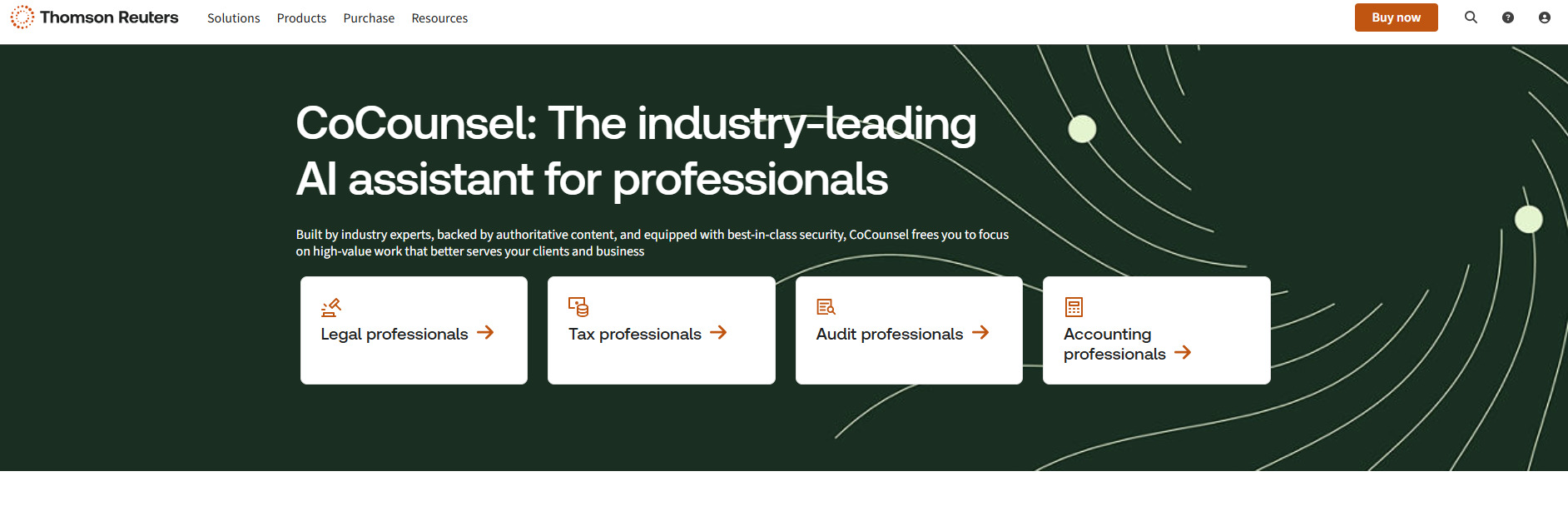
Source: Thomsonreuters.com
Powered by Casetext’s extensive legal database, it leverages the latest in AI legal technology to fine-tune its capabilities and offer more personalized and accurate assistance over time.
Key Features
- AI-powered legal research: Uses advanced legal AI to quickly find relevant case law, statutes, and legal precedents.
- Automated contract review: Analyzes contracts, flags risks, and suggests revisions to ensure compliance.
- Deposition preparation: Summarizes depositions, highlights key testimony, and extracts important details.
- Litigation strategy assistance: Provides AI-driven insights to help lawyers craft stronger legal arguments.
- Legal document analysis: Reviews legal documents for inconsistencies, missing clauses, and potential errors.
- Secure cloud-based storage: Keeps all legal research, documents, and case materials organized and accessible from anywhere.
- Real-time collaboration: Allows legal teams to work together on case analysis, research, and legal document review.
- Integration with legal tools: Connects with existing case management and document automation software.
10. UniCourt
UniCourt is a legal tech service that simplifies how law firms get their hands on and use legal data. It’s a go-to resource for law firms, businesses, and anyone who needs quick access to court records and insights into legal trends.
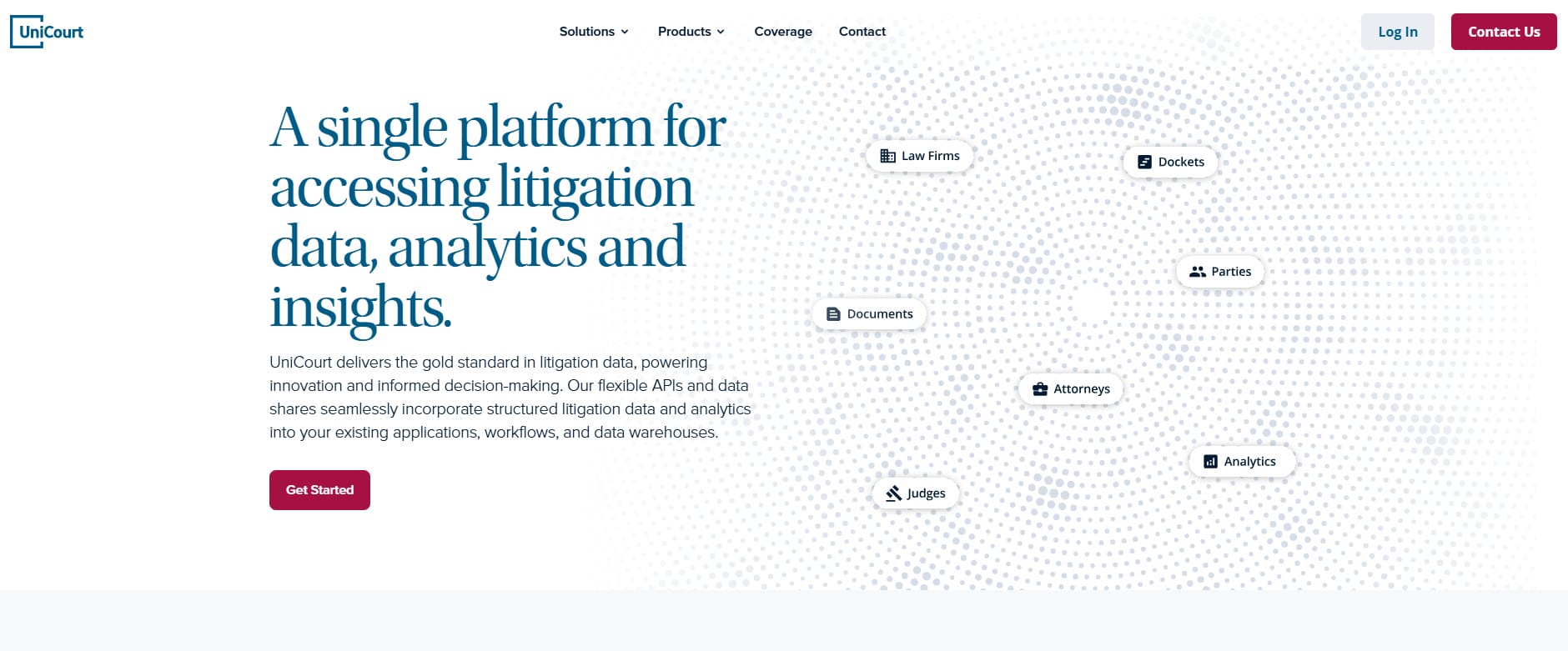
Source: UniCourt.com
The best feature of UniCourt is how it brings all kinds of legal data together under one roof. Whether you’re keeping tabs on a specific case or trying to spot trends in litigation, UniCourt lets you do it all without the need to jump between different databases.
Aside from accessing data, UniCourt helps you manage it better. You can set up alerts to track cases automatically, so you’re always in the loop with real-time updates without constantly checking in manually.
Key Features
- Automated court data access: Retrieves real-time case data from federal and state courts.
- Legal research & analytics: Provides AI-driven insights into case law, dockets, and litigation trends.
- Case tracking & alerts: Notifies users of case updates, filings, and procedural changes.
- API & data integration: Connects court records with legal and business intelligence platforms.
- Docket management: Centralizes court dockets for easy organization and access.
- Business & litigation intelligence: Identifies patterns in litigation to help firms assess risks and opportunities.
- Document retrieval: Automates access to pleadings, motions, and other legal filings.
11. Justpoint
Justpoint is a legal tech startup that combines AI and scientific research to spot harmful products and undisclosed adverse effects earlier, then helps people who may have been harmed understand their legal options.

Source: Justpoint.com
Victor Bornstein, the co-founder and CEO, trained in biomedical sciences, brings a research-first mindset to the company’s work, focusing on how data and science can surface risks tied to everyday consumer products sooner.
He co-founded Justpoint to apply innovation and an AI-driven solution to uncover harm earlier and help move people closer to justice.
Rather than selling a standalone tool to plaintiff law firms, Justpoint runs investigations, reviews records and research, and routes viable claims into litigation through Justpoint Law and partner law firms.
Key Features
- Legal AI-assisted risk detection: Uses large-scale analysis of research, safety signals, and real-world data to flag potential dangerous products (e.g., harmful drugs) and adverse effects.
- Medical record review and case viability screening: Evaluates medical records and related documentation to assess medical and legal viability.
- Scientist-led investigations: The company employs scientists and pairs AI output with reviews from experts across areas like toxicology, pharmacology, and epidemiology.
- Plaintiff intake and claim matching: Helps affected individuals submit information and get routed into an appropriate legal path.
- Litigation pathway through Justpoint Law and partners: Moves validated matters toward filing and case progression through its legal arm and partnered firms.
- No upfront fees for plaintiffs: Operates on a pay-only-if-you-win approach, covering case costs up front.
Why Briefpoint Sets the Standard for Discovery Automation
Legal discovery is often the most time-consuming part of litigation, not because it requires deep legal judgment at every step, but because the same tasks repeat again and again.
Drafting requests, preparing responses, tying productions to specific requests, and handling Bates numbers can quietly take over an entire case.

That’s the gap Briefpoint was built to address. It focuses on the work that slows teams down and clears it out of the way.
Briefpoint automates large portions of discovery drafting and production preparation so litigation teams can move faster and stay consistent across matters.
Reviews stay in human hands, timelines become easier to manage, and discovery stops feeling like the part of the case that throws everything off track, especially in matters with heavy document volume.
Curious what that looks like in practice?
FAQs About Legal Tech Companies
What is legal tech, and how does it benefit legal professionals and their clients?
Legal tech refers to the use of technology and software to provide legal services and support the operation of law firms and legal departments. Legal tech benefits legal professionals by streamlining workflows, reducing the time and cost associated with traditional legal processes, and enhancing the accuracy of legal documents and research.
For clients, legal tech can lead to quicker resolutions of legal matters, improved access to legal services, and, often, lower costs.
Can legal tech replace lawyers?
While legal tech software improves the efficiency and effectiveness of legal services, it is not designed to replace lawyers. Instead, it serves as a tool to assist lawyers in their work.
Technology can automate repetitive tasks and manage large volumes of data, but the nuanced judgment, ethical considerations, and client advocacy provided by human lawyers are beyond its current capabilities.
What are the top legal tech companies?
Top legal tech companies are those solving real operational problems across the legal industry, from discovery and practice management to contract workflows and litigation intelligence. These companies tend to set a market standard by focusing on efficiency, accuracy, and measurable outcomes rather than novelty alone.
What is a legal tech firm?
A legal tech firm builds technology designed to support or improve how legal work gets done. Some focus on software used by law firms, courts, or in-house teams, while others operate hybrid models that combine technology with legal services.
Depending on the focus, a legal tech firm may help lawyers produce documents faster (like demand letters and legal motions), manage data at scale, or support specific practice areas such as personal injury or litigation-heavy matters.
How is AI being used in legal tech, and what are its limitations?
AI in legal tech is commonly used to analyze large volumes of documents, extract information using natural language processing, and assist with drafting or review tasks through custom large language models. These tools can speed up routine work and surface patterns that would be difficult to find manually.
However, AI still requires human oversight. Legal judgment, ethical considerations, and context-specific decisions remain critical.
How can legal drafting software benefit an international law firm?
Legal drafting software streamlines corporate and transactional issues by automating contract creation, compliance filings, and other essential documents. This reduces manual effort, ensures consistency across jurisdictions, and improves efficiency.
How does an AI legal assistant support day-to-day legal work?
An AI legal assistant helps legal teams handle large volumes of information faster by organizing and reviewing materials such as medical data, police reports, and case documents. For example, in matters tied to product liability or broader public health concerns, an AI legal assistant can surface timelines, flag missing records, and group related evidence to support early case assessment.
The information provided on this website does not, and is not intended to, constitute legal advice; instead, all information, content, and materials available on this site are for general informational purposes only. Information on this website may not constitute the most up-to-date legal or other information.
This website contains links to other third-party websites. Such links are only for the convenience of the reader, user or browser. Readers of this website should contact their attorney to obtain advice with respect to any particular legal matter. No reader, user, or browser of this site should act or refrain from acting on the basis of information on this site without first seeking legal advice from counsel in the relevant jurisdiction. Only your individual attorney can provide assurances that the information contained herein – and your interpretation of it – is applicable or appropriate to your particular situation. Use of, and access to, this website or any of the links or resources contained within the site do not create an attorney-client relationship between the reader, user, or browser and website authors, contributors, contributing law firms, or committee members and their respective employers.
7 Best Legal Software for Small Firms
7 Best Legal Software for Small Firms
Like many small businesses and startups across different industries, small law firms wear a lot of hats.
Legal work shares space with client emails, billing, intake, and admin tasks that quietly eat up the day. When your team is lean, every extra step feels heavier, and every delay shows up fast.
Fortunately, good legal software can quickly change how your day flows. At the very least, the right tools take routine work off your plate and help you stay focused on the parts of the job that actually need your judgment.
That’s why we made this list to highlight legal software that fits how small firms really operate: practical, flexible, and built to support a steady workload.

Top 7 Legal Tools for Small Law Firms
Here’s a look at some of the best tech tools that can serve smaller firms well:
1. Briefpoint: Discovery Document Automation
Briefpoint is built for one of the most time-consuming parts of litigation: drafting discovery documents. If discovery shows up often in your caseload, this is the kind of tool that quickly earns its place.
Requests for production, requests for admission, and interrogatories all follow familiar patterns, yet drafting them still eats up hours.
With Briefpoint, you upload the discovery request, and the AI pulls out the core details to create a solid draft right away.

Most of the routine work is handled in minutes. You can review the draft in Word, select objections or responses from Briefpoint’s built-in menu, and focus your attention on the parts that actually need legal judgment.
Briefpoint also includes AutoDoc, which automatically generates properly structured discovery documents with Bates numbers from the uploaded requests. This keeps formatting consistent and removes the need to set documents up manually each time.
Plus, client responses are handled through Briefpoint Bridge. You send clients only the interrogatories they need to answer, rewritten in plain language. They respond online, and their answers drop straight into your document.
Key Features
- AI-powered automation: Briefpoint takes care of the routine details in your discovery documents, so you don’t have to.
- Bridge for client responses: This feature translates legal jargon into simple language to make it easy for clients to respond. Their answers are automatically added to your documents.
- Built-in objections and responses: Customize your documents with a click by adding responses or objections from the built-in menu.
- AutoDoc document creation: Automatically generates properly structured discovery responses based on uploaded requests, removing manual setup work.
- Microsoft Word compatibility: Edit, review, and finalize discovery documents directly in Word without changing your workflow.
- Client-friendly response forms: Clients answer only the interrogatories that apply to them through a simple online interface.
- Consistent formatting: Keeps discovery documents clean and uniform across matters and attorneys.
Pros
- Automates the most time-consuming parts of discovery drafting
- AutoDoc removes manual document setup
- Clients respond without getting stuck on legal language
- Responses flow directly into your document
- Flexible pricing that works well for small firms
Test Briefpoint yourself by scheduling a demo here.
2. Clio: Legal Practice Management Software
Clio is one of the most widely used law practice management software programs, and for good reason.
While not exclusively a piece of small law firm software, Clio is built to support firms of all sizes. It is valuable for any practice looking to improve law firm efficiency without adding complexity.
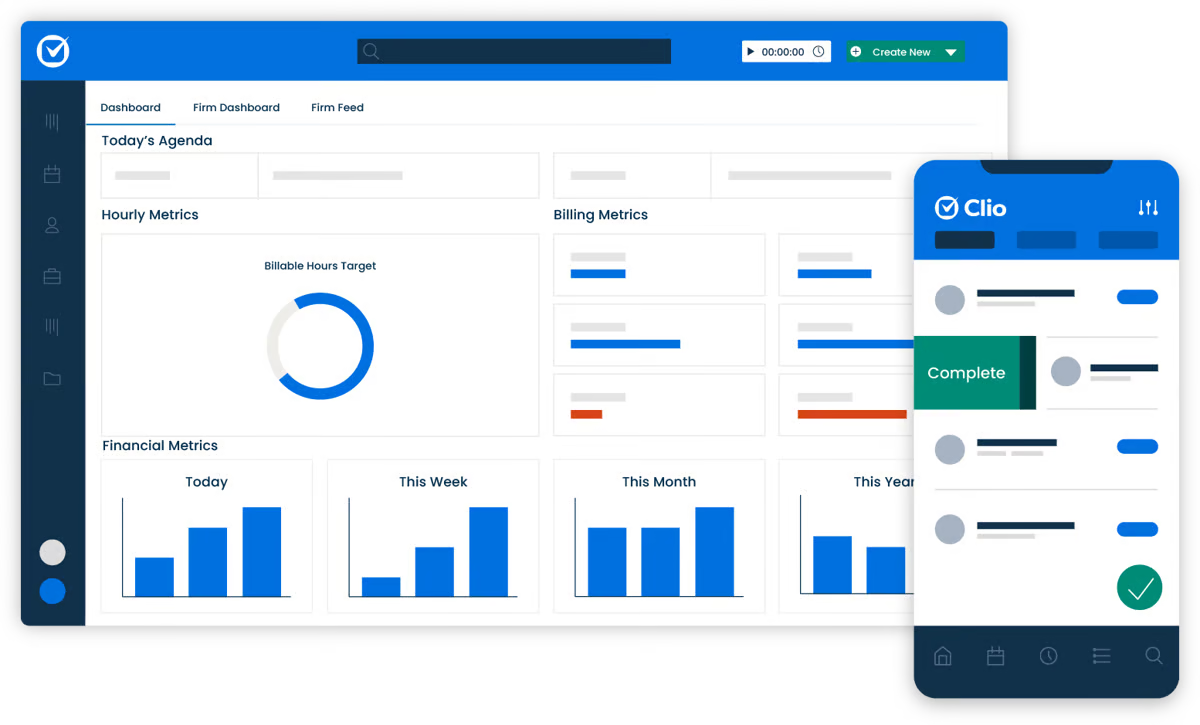
Image source: G2
Its biggest strength? Flexibility. Clio is a cloud-based solution, so you can access everything from your laptop, phone, or tablet. It also plays well with tools you likely already use, which makes it easier to manage client relationships and avoid bouncing between systems.
For small firms, Clio helps centralize casework, streamline legal billing, and support secure document sharing, all while keeping your team connected.
It’s also a solid choice if you’re aiming to onboard new clients faster and stay responsive without adding overhead.
Key Features
- Case management: Keep all your case info, deadlines, and notes in one place.
- Time tracking and billing: Log hours and create invoices with just a few clicks.
- Client portal: Securely share documents and messages while improving how you manage client relationships.
- Integrations: Sync with Google Calendar, Microsoft Office, and more for smoother workflows.
- Mobile app: Stay productive on the go with access to cases, time logs, and messages from anywhere.
Pros
- Brings case management, billing, and client communication into one streamlined system
- Remote access helps you keep work moving, no matter where you are
- Reliable customer support that’s especially helpful for smaller teams without internal IT
- Easy-to-use interface so that you can get started without a steep learning curve
3. MyCase: Legal Case Management Software
MyCase is a suitable choice for small firm attorneys who want to stay focused on legal work without getting bogged down by unnecessary extras. It’s specifically for law offices that need to manage cases efficiently while simplifying day-to-day administrative duties.
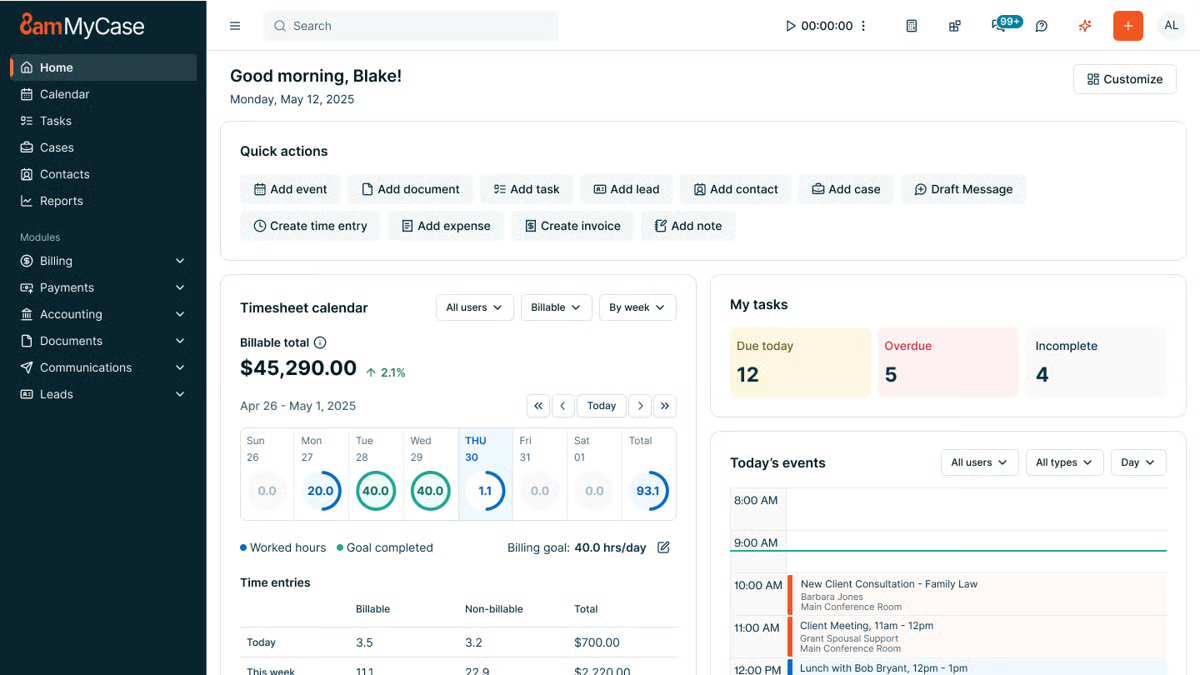
Image source: G2
Rather than trying to do everything, MyCase keeps it simple and strong: track cases, manage documents, and stay on top of tasks from one dashboard.
This all-in-one platform also has a built-in client portal that makes communication easy and secure. This way, you can keep clients in the loop without switching platforms and increase client satisfaction along the way.
Key Features
- Case tracking: Stay on top of every detail with an intuitive case dashboard.
- Document management features: Store and organize legal files so they’re always accessible.
- Task management: Assign and monitor tasks across your team to keep things moving.
- Client communication: Use the secure portal to share documents and case updates without the back-and-forth emails.
Pros
- Built with small legal firms in mind, which means it focuses on what matters without unnecessary features
- Centralizes all case documents and updates to make your law office more organized
- Makes it easy to communicate with clients, handle the client intake process, and provide updates
- Clean, user-friendly interface that minimizes time spent on administrative tasks
4. CosmoLex: Billing and Accounting Software
CosmoLex is one of the best legal billing software tools to date. It’s a smart pick for small law firms that want to handle billing, accounting, and trust management without needing to connect multiple tools.
This legal billing software is specifically for law firms, which means it supports the financial workflows and legal regulations that general accounting software often overlooks.
Image source: G2
From generating invoices to managing trust accounts and tracking expenses, CosmoLex covers the full scope of financial management for your firm.
This legal accounting software tool also allows you to generate detailed financial reports, which can give you a clear view of your law firm’s performance at any moment.
For solo attorneys or small firms, this transparency helps you make better business decisions without sacrificing client service or compliance.
Key Features
- Legal billing and invoicing: Track time, send invoices, and accept online payments without leaving the platform.
- Trust accounting: Built-in tools help maintain compliance with legal trust requirements and avoid costly errors.
- Time tracking: Easily log billable hours and assign them to specific cases from anywhere.
- Full legal accounting: Manages expenses, payroll, taxes, and general ledger, tailored to legal-specific needs.
- Financial reporting: Quickly generate detailed financial reports to stay on top of your law firm’s finances.
Pros
- Robust features cover billing, accounting, and trust management in one cloud-based system
- Reduces manual accounting work that often leads to errors or delays
- Clear reporting gives better visibility into firm performance and cash flow
- Designed specifically for legal workflows, which makes daily financial tasks easier to handle
5. NetDocuments: Document Management Software
NetDocuments is a reliable choice for law firms that want to simplify how they store, manage, and access files.
For small firms balancing casework and administrative duties, this cloud-based software takes the stress out of document storage and organization.
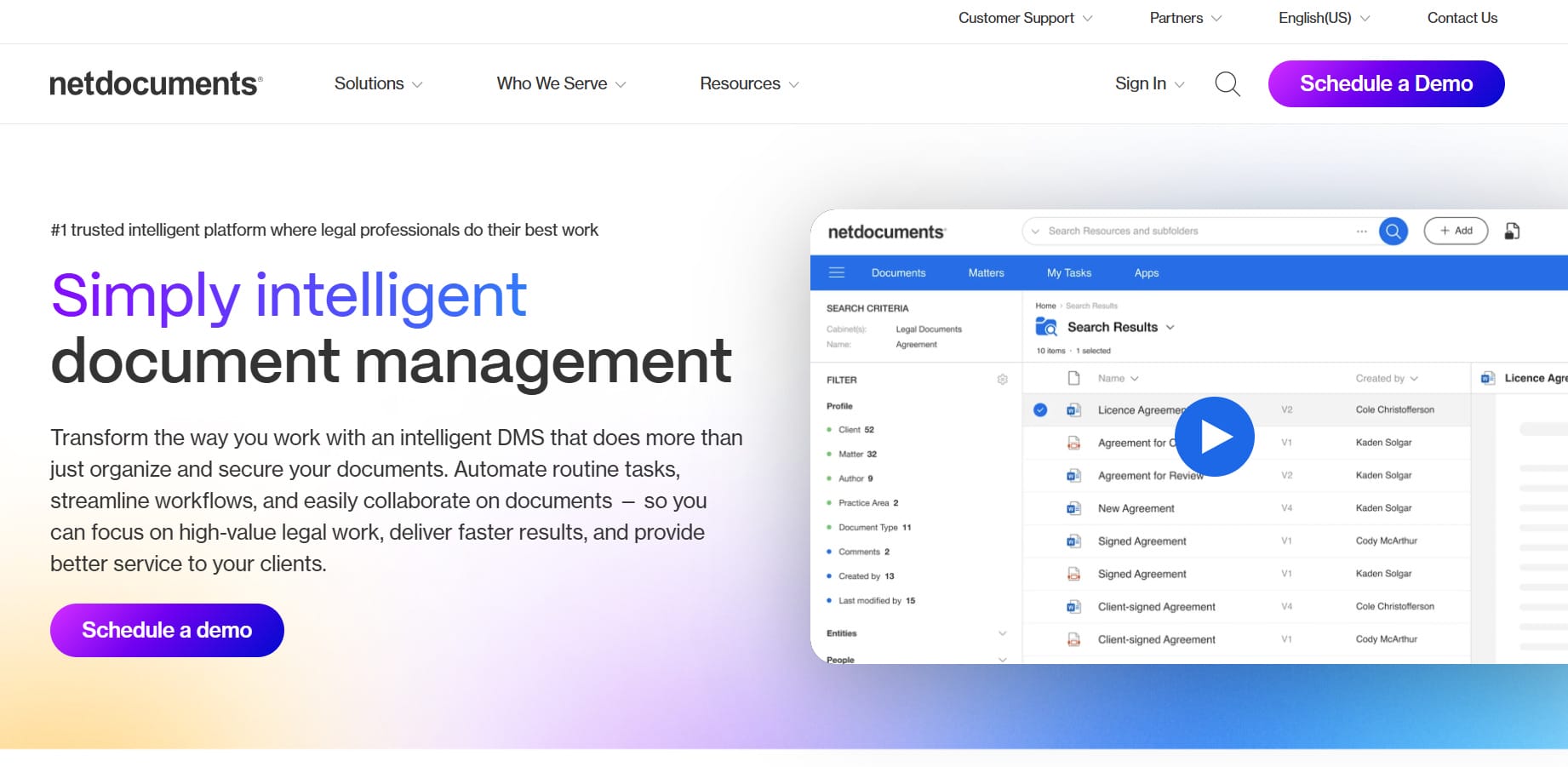
Source: NetDocuments.com
Built specifically for legal professionals, NetDocuments offers a secure and intuitive way to manage case details and sensitive files.
With robust compliance standards, version control, and powerful search capabilities, it helps reduce the learning process that often comes with adopting new tools.
Whether you’re working from the office or remotely, you’ll be able to access files quickly, collaborate with your team, and build strong client relationships by staying organized and responsive.
It also integrates seamlessly with tools like Microsoft Word, which allows you to work within familiar environments while maintaining secure document workflows.
Key Features
- Cloud-based storage: Secure access to all your files from anywhere.
- Advanced search tools: Quickly locate case details or documents by keyword, metadata, or full-text search.
- Version control: Keep track of every document revision so you can easily refer back to earlier versions.
- Microsoft Word integration: Edit, save, and manage documents directly from Word.
Pros
- Centralized document storage makes it easy to efficiently manage case files
- Cloud-based software allows your team to collaborate and access documents from anywhere
- Helps maintain strong client relationships through fast, reliable access to case materials
- Version control ensures clarity and accuracy when multiple people are editing the same file
6. CloudLex: Matter Management Software
CloudLex is purpose-built for small and mid-sized law firms that want to stay organized while managing legal matters from intake through resolution.
It’s more than just a case tracker, though. It’s a full matter management system designed to support collaboration, document assembly, and client communication across your entire team.
Image source: G2
What makes CloudLex stand out is its emphasis on teamwork. It helps your staff stay aligned, cuts down on internal confusion, and makes sure everyone is working with the same case information.
It’s also cloud-based, which means you can securely access and manage your matters from anywhere.
Additionally, CloudLex helps keep clients informed without extra effort. Through its secure client portal, you can share documents, send updates, and manage client communication efficiently, all while protecting valuable time that would otherwise be spent on back-and-forth.
Key Features
- Matter tracking: Manage all case-related data, deadlines, tasks, and contacts in a single place.
- Collaboration tools: Keep your team aligned by sharing documents and updates in real-time.
- Client management and communication: Use the client portal to keep clients informed and minimize inbox overload.
- Task management: Assign, track, and complete tasks without missing a beat.
- Cloud-based access: Log in from anywhere and stay connected to your firm’s caseload at all times.
- Document assembly: Streamline repetitive paperwork with built-in document creation tools.
Pros
- Collaboration tools make it easier to manage cases as a team, even across locations
- Keeps your clients informed through secure, centralized communication channels
- Scales well for firms handling tens of thousands of legal matters across different attorneys
- Helps small firms save valuable time by automating repetitive administrative steps
7. DocuSign: Electronic Signature Tool
DocuSign is a familiar name for a reason. It gives small and mid-sized law firms a simple way to send documents out for signature and get them back faster than pen-and-paper methods.
The platform stays focused on one thing and does it well: getting documents signed. Engagement letters, agreements, settlement paperwork, and similar files move through the signing process quickly, which helps keep matters moving forward.
Source: G2
Clients tend to pick it up right away. Documents arrive ready to sign, work on any device, and don’t require logins or setup. You can also see when a document has been opened or signed, which makes follow-ups easier and more predictable.
And since DocuSign runs in the cloud, signed documents are always accessible and securely stored. It also works comfortably alongside tools you already use.
Key Features
- Electronic signatures with audit trails: Track when documents are sent, viewed, and signed for clear records.
- Multi-device signing: Clients and staff can sign from desktop, tablet, or mobile devices.
- Document templates: Reuse commonly signed documents to save preparation time.
- Status tracking: See real-time updates on document progress without checking in manually.
- Secure cloud storage: Store completed documents safely and retrieve them when needed.
- Integrations: Connect with Microsoft Word and popular cloud storage platforms.
Pros
- Speeds up document signing without changing how your firm works
- Easy for clients to review and sign documents from anywhere
- Clear visibility into document status reduces follow-up emails
- Fits well into small firm workflows that already rely on digital tools
Factors to Consider When Choosing Legal Tools for a Small Firm
When selecting the right legal technology software for your small law firm, it’s important to make sure it fits your firm’s unique needs and helps simplify your daily tasks.
Keep these factors in mind:
- Budget – Choose a solution that fits your financial limits without cutting essential tools like expense tracking or payment processing.
- Ease of use – You shouldn’t need a manual to get started. Look for tools that are simple enough for any managing partner or staff member to pick up quickly.
- Cloud-based vs. on-premise – Cloud-based platforms offer more flexibility, letting you access case files and client details from anywhere.
- Data security – With sensitive information involved, strong encryption, backups, and two-factor authentication are a must.
- Customer support – Issues will pop up. Fast, reliable support through phone, chat, or email can keep your workflow on track.
- Integrations – Choose tools that connect with your calendar, email, and billing systems to avoid rework and delays.
- Scalability – Pick software that can grow with you, whether that’s handling more clients or supporting additional attorneys.
A strong platform lets your firm operate more smoothly in all kinds of ways (or just the ones you need). Remember that it’s not just about tech; it’s about making each day easier to manage.
Build Your Tech Stack With the Right Law Firm Software
As you can probably tell by now, finding the right legal software can really transform how your small law firm operates.
Tools like MyCase and NetDocuments help streamline everyday tasks, but if you’re dealing with discovery documents often, Briefpoint is the perfect way to save both time and effort.
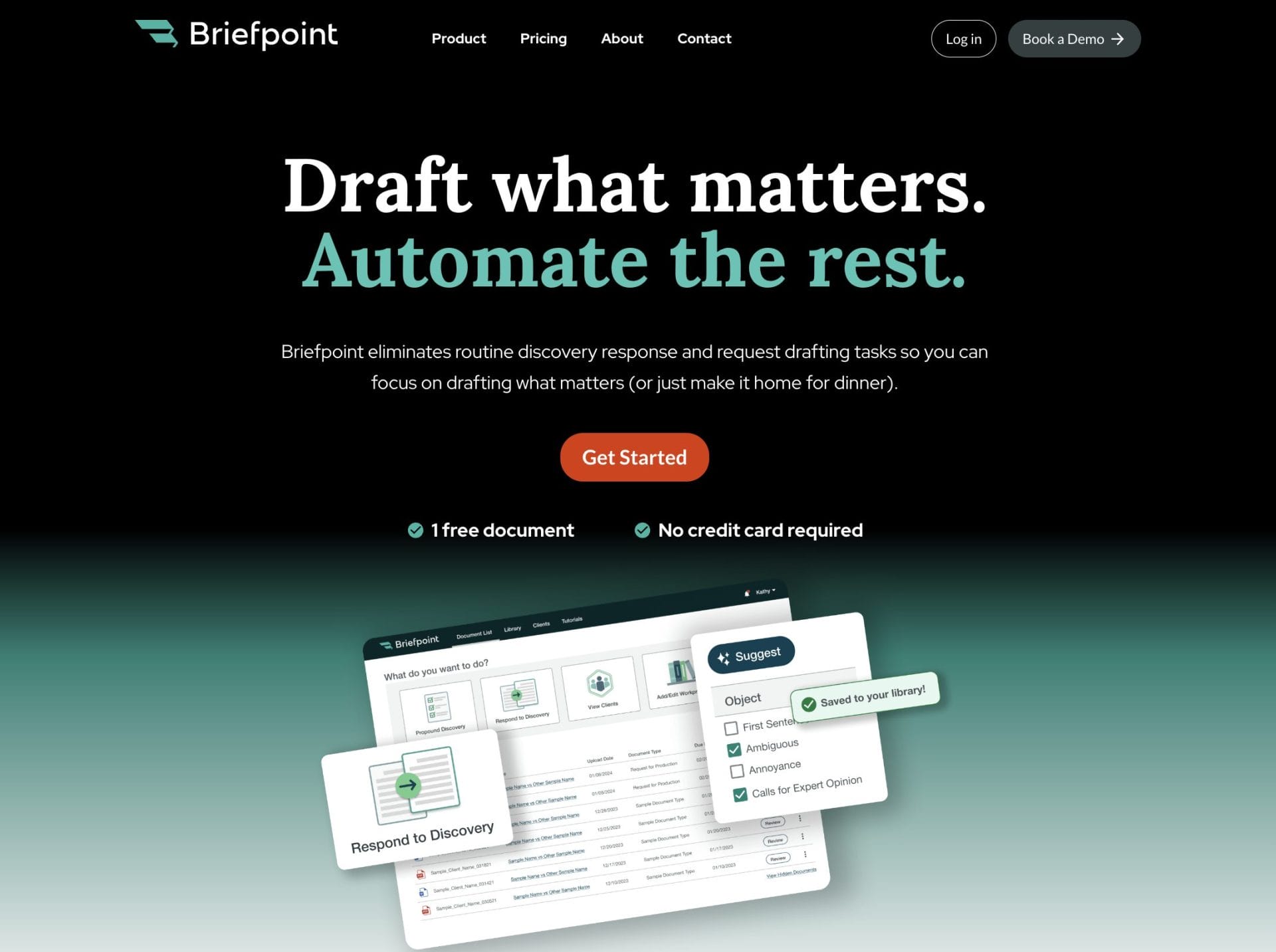
Why not give it a try? With Briefpoint, you can cut down the hours spent on drafting discovery documents and get back to focusing on your clients.
It’s fast, tailored for small law firms like yours, and already trusted by over 1,500 law firms.
Ready to see how much time you can save? Schedule a demo with Briefpoint today and discover how much smoother your workday can be!
FAQs About Legal Software for Small Firms
What is the most common legal software?
Most small law firms rely on practice management software to track case details, handle billing, and manage client communication in one place. Tools like Clio, MyCase, and CosmoLex are common because they cover daily operations without requiring a large staff or complex setup.
How does legal software help small firms stay organized?
Legal software brings case files, calendars, and legal documents into one system, which helps manage client information and reduces time spent searching across emails or folders. For small firm paralegals, this structure makes day-to-day work easier to keep up with.
Can legal software improve client communication?
Yes. Many platforms include client portals and messaging tools that support smoother client interactions. Clients get updates, share information securely, and respond faster, which often leads to firms getting paid faster and spending less time on follow-ups.
Is legal software worth it for solo and small teams?
For many firms, the value shows up quickly. Features like automated billing, shared case timelines, and tools that automate task assignments free up more time practicing law while keeping work moving even with a lean team.
The information provided on this website does not, and is not intended to, constitute legal advice; instead, all information, content, and materials available on this site are for general informational purposes only. Information on this website may not constitute the most up-to-date legal or other information.
This website contains links to other third-party websites. Such links are only for the convenience of the reader, user or browser. Readers of this website should contact their attorney to obtain advice with respect to any particular legal matter. No reader, user, or browser of this site should act or refrain from acting on the basis of information on this site without first seeking legal advice from counsel in the relevant jurisdiction. Only your individual attorney can provide assurances that the information contained herein – and your interpretation of it – is applicable or appropriate to your particular situation. Use of, and access to, this website or any of the links or resources contained within the site do not create an attorney-client relationship between the reader, user, or browser and website authors, contributors, contributing law firms, or committee members and their respective employers.
5 Top RFP Automation Tools for Legal Teams
5 Top RFP Automation Tools for Legal Teams
Requests for production (RFPs) play a key role in civil litigation. Fundamentally, they give one party the right to ask for specific documents or records that relate to the case, such as contracts, emails, financial files, and more.
These requests are formal and often strict, which means the responses must be complete, properly formatted, and submitted on time. So, when a matter involves hundreds or even thousands of documents, staying organized becomes just as important as the content itself.
But manual work can only take you so far. As caseloads grow, it gets harder to keep up with every draft, review, and edit. That’s why more legal teams are turning to automation.
With the right tools, firms can handle RFPs faster, keep responses consistent, and avoid the common mistakes that come from doing everything by hand.
In the sections below, we’ll break down what this looks like in practice and highlight a few platforms built specifically for legal document production.
What Are Requests for Production?
In most lawsuits, a big part of discovery comes down to requests for production. These are formal legal requests asking one party to provide documents, records, or other evidence that relate to the case.
Essentially, they help both sides understand the facts before going to trial. You might see RFPs asking for things like:
- Contracts or business agreements
- Internal emails or written communications
- Financial statements and transaction records
- Reports, memos, or other supporting documents
If you’re managing a case, you’ll need to review every request carefully, gather the right files, and make sure nothing confidential slips through. Each page has to be labeled and sometimes redacted before it’s shared with opposing counsel.
This process is one of the most time-consuming parts of discovery. It requires close attention to detail and a clear litigation workflow to stay organized. When handled properly, RFPs help both sides exchange evidence fairly and keep the case moving toward resolution.
What Is RFP Automation?
RFP automation uses technology to manage the RFP response process from start to finish with less manual effort. It replaces repetitive administrative work with smart automation software that supports accuracy, speed, and collaboration across legal teams.
RFP automation often includes:
- Automated document drafting: Templates generate responses that follow required formats and case standards.
- Workflow automation: Tasks like review, approval, and version tracking move through the process without delays.
- Artificial intelligence review: AI checks for missing details, detects inconsistencies, and helps improve response quality.
- Centralized collaboration: Teams can review and update documents together, keeping every edit in one place.
This approach reduces human error, organizes large document sets, and keeps discovery work consistent across cases. Additionally, legal teams gain a structured process that keeps everything on track.
Briefpoint brings this approach to life with tools designed specifically for law firms managing discovery and document production.
Book a demo with Briefpoint to experience how automated RFP workflows can save time and support better accuracy in your legal practice.
What Are the Benefits of Using RFP Automation Tools?
After understanding what RFP automation is and how it works, the next question is simple: What difference does it actually make?
Below are some of the main benefits that legal teams see when using RFP automation tools:
Consistent Formatting and Compliance
One of the most overlooked risks in the RFP process is inconsistent formatting. When teams pull content from old files or past submissions, it’s easy to end up with errors like mismatched fonts, broken citations, or incomplete responses.
Luckily, a strong RFP automation platform can solve this by applying formatting rules automatically across each RFP document.
With built-in templates and a central content library, legal teams don’t have to start from scratch or guess what structure to follow. The platform makes sure that every clause, exhibit, and reference is placed in the right order, using the right layout.
It also helps with compliance. By guiding teams through required steps and flagging missing elements during document creation, automation reduces the chance of skipping key details or violating rules for discovery documents.
Smarter Workload Management
Managing RFPs often turns into a long list of repetitive tasks, such as copying old responses, fixing formatting issues, updating document versions, and chasing feedback. These steps might seem small, but they add up quickly and take time away from legal review and strategy.
With RFP automation software, much of that work gets handled in the background. For starters, it means:
- Standard language drops in automatically
- Documents stay organized
- Version tracking happens without extra effort
The process becomes more structured, and progress is easier to follow. Instead of reacting to every task as it comes in, you get a legal workflow that keeps things clear, repeatable, and less stressful.
Improved Team Collaboration
The RFP process often involves input from multiple people, like attorneys, paralegals, and subject matter experts. Without the right tools, this can lead to version confusion, duplicate work, or missed updates. Everyone ends up working in their own silo, which slows things down.
Modern collaboration tools built into RFP automation platforms fix this by letting users work together in real time. Edits, comments, and updates all happen in one shared space, so nothing gets lost.
For example, a senior attorney can review a draft while a paralegal updates dates and attachments. They don’t have to email back and forth, nor do they have to struggle with a version mismatch.
This kind of setup also supports knowledge management, which makes it easier to reuse strong content across cases without starting from scratch.
Working together across the entire RFP process becomes smoother, with fewer gaps and better communication at every step.
Better Accuracy Through AI
Manual review has limits, especially when teams are under pressure or handling large volumes of documents. That’s where artificial intelligence helps improve consistency.
Many RFP automation tools now use natural language processing (NLP) to read and understand written text. This allows the software to suggest relevant answers, spot missing information, and flag inconsistent language before anything is submitted.
The result is high-quality responses that require fewer rounds of edits and reduce the chance of errors slipping through. For firms handling similar requests across matters, AI can even suggest language based on past responses.
That said, AI is not a replacement for legal review. It supports the process but still requires a human to check the final content. Used carefully, though, it can raise the overall quality of every response.
Faster Client Turnaround
The last (but perhaps the most important) benefit of RFP automation is how much faster you can deliver work to clients. When deadlines are tight and expectations are high, speed matters.
Automating repetitive tasks like formatting and organizing attachments removes the bottlenecks that usually slow things down. With AI automation reviewing content in real time, there’s no need for multiple revision cycles or last-minute fixes.
The difference shows up in your delivery. Clients receive accurate, polished responses without delays or excuses. Such a level of consistency builds trust and gives your team more breathing room to handle urgent matters without falling behind.
Best RFP Software on the Market Today
Not all RFP tools are built for legal work, and choosing the right one can make a big difference. Let’s take a look at a few standout options you can consider for your tech stack:
1. Briefpoint
Briefpoint is purpose-built for automating discovery responses and drafting across the full range of civil litigation.
It focuses on requests for production, interrogatories, and requests for admission, supporting both propounding and responding across all U.S. state and federal courts.
What sets it apart is its ability to generate high-quality, jurisdiction-ready documents in just a few minutes, using the details of a complaint or discovery request as the starting point.
Instead of spending hours drafting, formatting, and reviewing responses, legal teams use Briefpoint to cut down manual tasks, speed up turnaround, and maintain consistent quality across every case.
Whether you’re handling one RFP or an entire set of discovery requests, Briefpoint handles the heavy lifting with built-in formatting, objection-aware phrasing, and ready-to-edit templates that follow court rules.
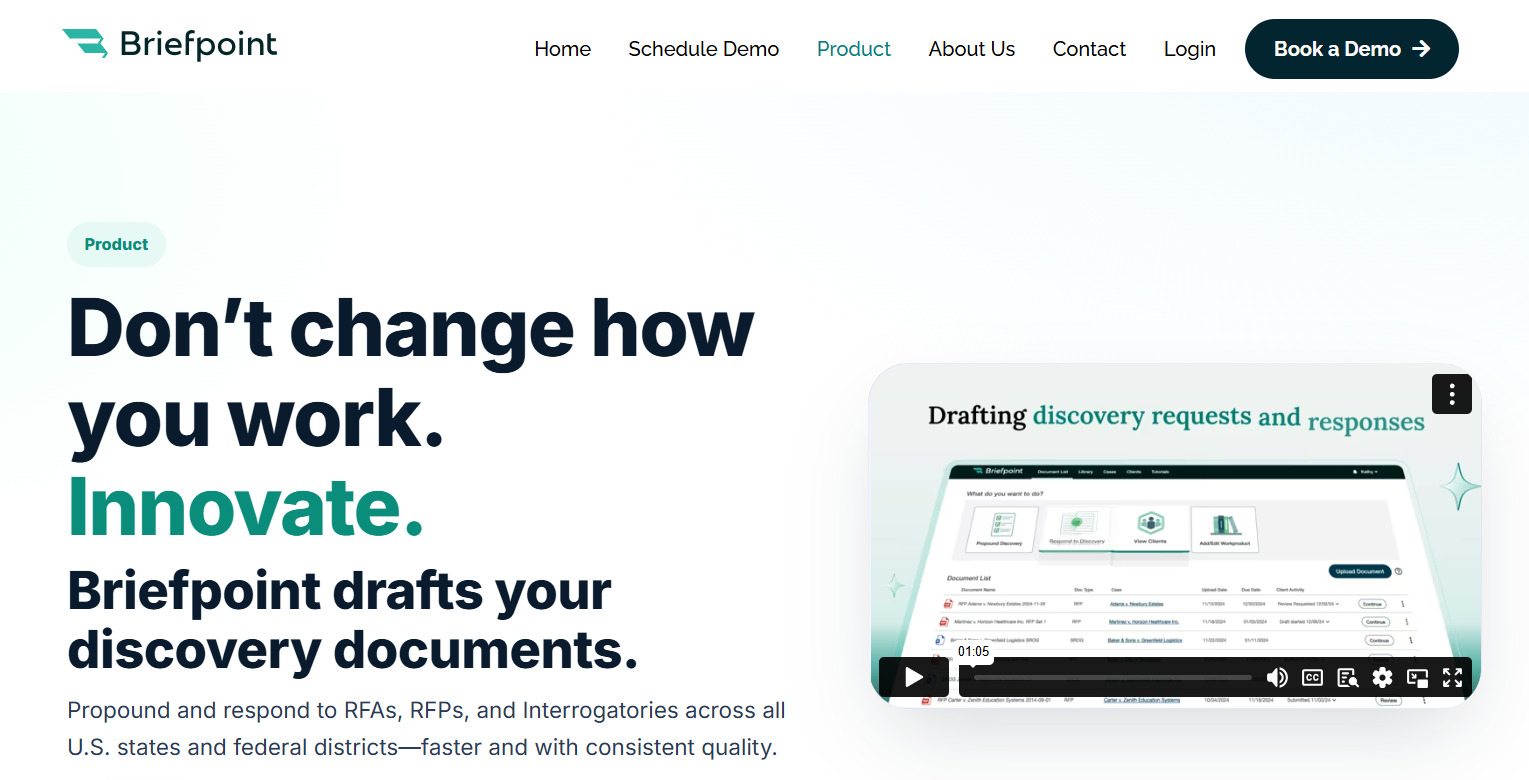
Best Features
- Automated document drafting: Upload a complaint and generate up to 70 tailored RFPs, RFAs, and Interrogatories in under 3 minutes.
- Jurisdiction-ready output: Built-in support for state and federal formatting, captions, numbering, definitions, and timeframes.
- Objection-aware language: Avoids ambiguity, compound structure, and vague phrasing by default.
- Full-cycle coverage: Supports both propounding and responding, so you can manage the entire process in one place.
- Standardized templates: Apply your firm’s preferred language and regenerate content with consistent formatting across matters.
- AI-assisted objections: Draft stronger responses using suggested language and firm-approved objections.
- Integration with Word: Export finished documents directly to Word for final review, signature, and service.
- Secure by design: SOC 2 certified, HIPAA-compliant, and never uses your data for model training.
Want to see how you can automate your RFP documents and discovery responses with consistency and control? Book a demo today!
2. Clio Draft
Clio Draft (formerly known as Lawyaw) is part of the Clio ecosystem and focuses on automating document creation for law firms.
It’s suitable for firms already using Clio’s project management or contract management tools, helping keep documents connected to case data and client records.

Source: Clio.com
With customizable templates and built-in logic, Clio Draft supports automated workflows that generate legal documents based on answers to simple form fields. This reduces the need for repetitive editing and keeps files up to date with the latest case information.
It also helps standardize common documents across a firm, which means less guesswork and fewer errors in formatting. While it’s not designed specifically for RFPs, Clio Draft can be useful for building initial responses or handling related correspondence as part of a larger discovery process.
Best Features
- Custom template builder: Create reusable forms with conditional fields to speed up drafting.
- Case data integration: Pulls information directly from Clio case files to auto-fill documents.
- Cloud-based editing: Draft and update documents from anywhere with an internet connection.
- Clio platform sync: Works with Clio Manage and Clio Grow to connect documents with your full client lifecycle.
- Team collaboration: Share templates and drafts with colleagues for real-time input.
- Status tracking: Monitor document progress and make sure each one stays aligned with project timelines.
3. Noloco
Noloco is a no-code platform that helps legal teams build internal tools for document tracking, task coordination, and client-facing workflows. It’s not built specifically for RFPs, but it can be configured to support the document management and review process behind them.
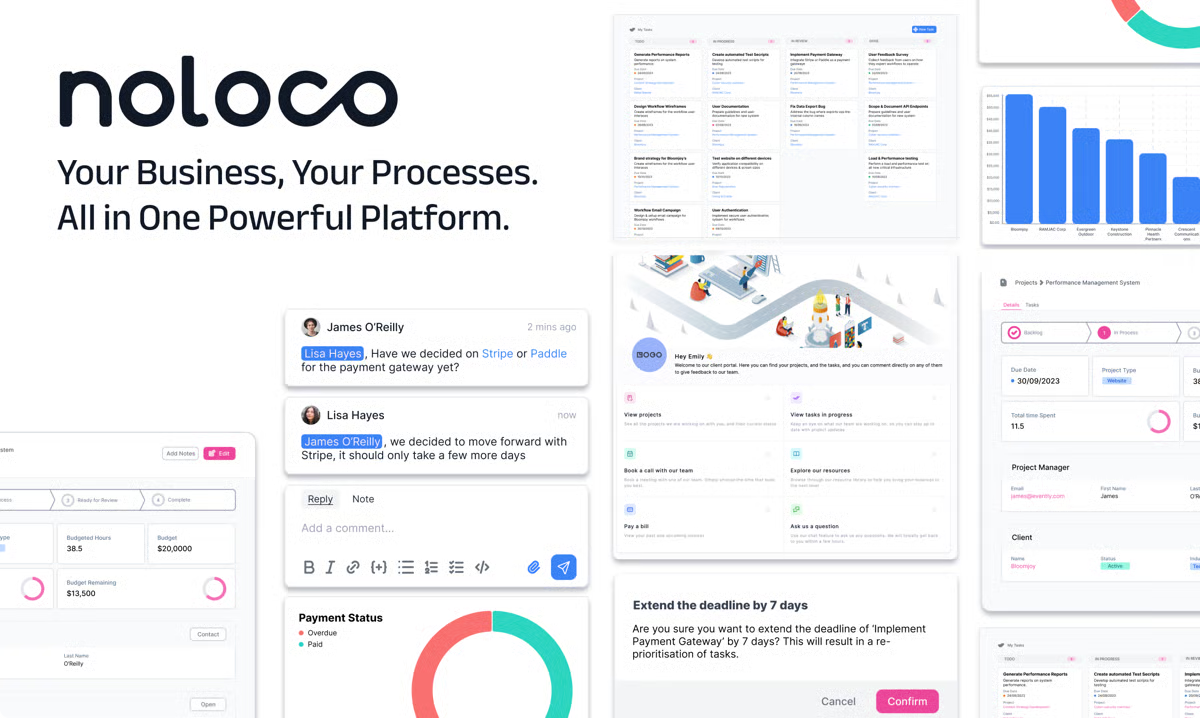
Source: G2
What makes Noloco stand out is its ability to pull data from existing systems (like spreadsheets, forms, or CRMs) and organize it into a centralized platform. This makes it easier to manage document requests, deadlines, and status updates across multiple matters or departments.
Teams can also build custom apps to handle workflows related to RFP tracking or intake. And with its growing library of AI-powered features, users can add smarter filtering and automation tools to improve consistency over time.
Best Features
- Custom app builder: Design internal tools without code for document tracking, workflows, or intake.
- Data syncing: Pulls live data from sources like Airtable, Google Sheets, or PostgreSQL.
- Centralized dashboard: View tasks, timelines, and document updates in one place.
- Access controls: Set permissions by user or role to protect sensitive case data.
- AI tools: Add logic for document tagging, workflow triggers, or status updates.
- Scalable setup: Adjust layouts and fields easily as team needs grow or future projects shift.
4. Mitratech Legal Document Automation
Mitratech Legal Document Automation is built for legal departments and firms handling high-volume document work. It’s part of Mitratech’s larger suite of legal operations software, which offers scalable support for drafting, collaboration, and approvals.
While it’s often used for contracts and compliance-related tasks, it can also support structured automated processes involved in preparing and managing RFP responses.
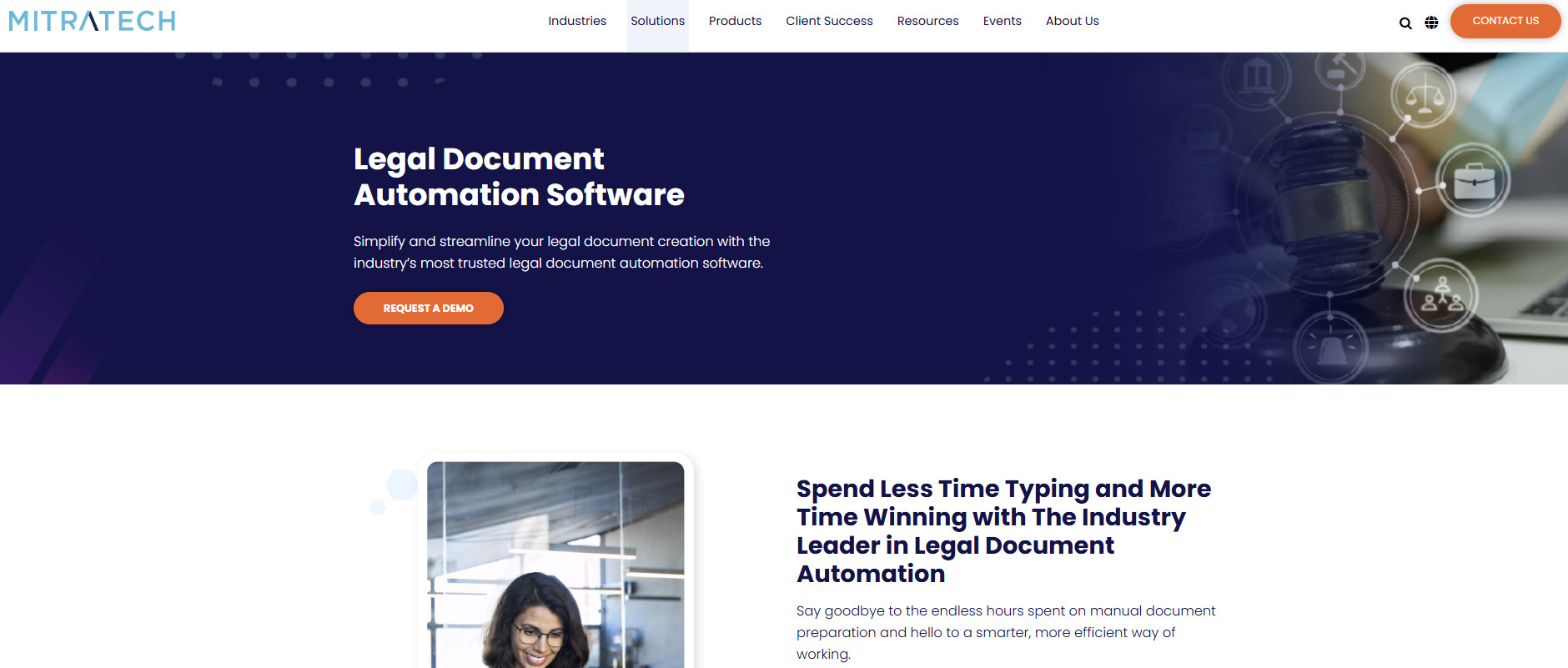
Source: Mitratech.com
Mitratech allows team members to collaborate on documents through shared templates and controlled workflows. It pulls relevant content from pre-approved language libraries and adapts it to the context of each matter, which can help teams avoid drafting errors and stay consistent.
Designed with enterprise needs in mind, the platform also includes advanced security features like permission controls, audit trails, and encryption.
Best Features
- Clause library: Store and reuse pre-approved language across different document types.
- Workflow management: Assign tasks and approvals to specific team members with status tracking.
- Template control: Keep templates locked and editable only by authorized users.
- Version tracking: Monitor document changes and restore prior versions as needed.
- Advanced security: Protect sensitive data with built-in encryption and audit logs.
- Enterprise integration: Connects with other Mitratech products and third-party systems for seamless operation.
5. Rally
Rally is a legal workflow platform designed to support document creation, task management, and collaboration within law firms and legal departments.
Although not built exclusively for RFPs as well, its flexible automation features make it a useful option for firms that want to manage document-heavy processes with more structure.

Source: RallyLegal.com
Rally works well for large enterprises looking to unify legal operations across multiple teams. It integrates with existing tools like email, document storage systems, and CRM systems, which helps centralize case and client information.
For firms that handle recurring requests or complex workflows, Rally provides visual builders to map out processes from start to finish.
One of its key strengths is detailed analytics. Users can track time spent on documents, identify bottlenecks, and monitor overall workflow performance. These insights are useful for teams managing RFP timelines across multiple matters.
Best Features
- Workflow builder: Create custom workflows for approvals, drafting, and client communication.
- CRM integration: Connect client data directly to legal projects and document templates.
- Collaboration tools: Assign tasks, leave comments, and track updates in real time.
- Document automation: Populate templates using form-based inputs and conditional logic.
- Analytics dashboard: Monitor time, output, and team performance across matters.
- Cloud-based access: Work securely from any location, with support for remote teams.
The Right Tool for RFP Documents Starts with Briefpoint
Legal work moves fast, and RFP responses leave little room for mistakes. You’ve seen how legal automation can help organize workflows, reduce errors, and speed up delivery, but not every tool is made for discovery.
Many platforms try to cover everything, but fall short when it comes to the details attorneys care about: formatting, objections, and jurisdiction-specific rules.
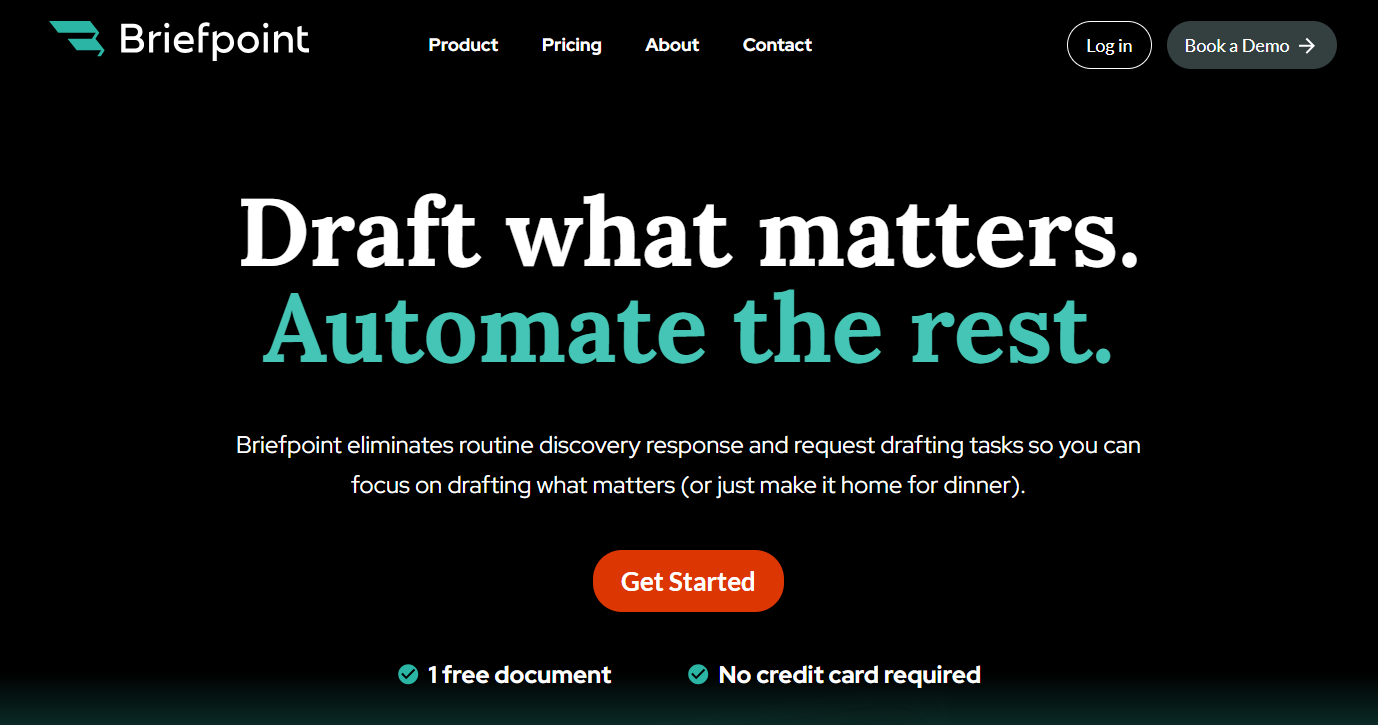
Briefpoint was built with those details in mind. It’s not a general-purpose automation tool. It’s focused on drafting and responding to discovery documents, including RFPs, with speed and structure that match legal standards across all U.S. states and federal courts.
From objection-aware phrasing to jurisdiction-ready formatting, every part of the process reflects how legal professionals actually work.
If you’re spending too much time reviewing templates, rewording vague requests, or fixing formatting errors, there’s a better way.
Book a demo with Briefpoint and see how much easier discovery becomes when the tool is designed for it.
FAQs About RFP Automation Tools
What is RFP automation software?
RFP automation software is a tool that helps legal teams and other professionals handle requests for production and proposals by automating document drafting, formatting, and tracking. It reduces manual effort, improves consistency, and supports better collaboration across teams. Some platforms also handle related tasks like security questionnaires, intake forms, and template management.
How to automate an RFP process?
To automate the RFP process, start by using a platform that supports RFP templates, content libraries, and rule-based workflows. Upload past responses or build a set of standard clauses, then set up approval steps and document tracking. With the right system, much of the drafting and formatting happens automatically, so you can focus on reviewing and finalizing.
What are the tools used in RFP?
Common RFP response software includes tools like Briefpoint, Mitratech, and Clio Draft. These platforms help with drafting, collaboration, content reuse, and workflow tracking. Depending on your needs, you may also use content management tools or analytics dashboards to monitor performance.
What are examples of automation tools?
Examples include platforms like Briefpoint for legal discovery, RFPIO for sales and procurement teams, and Loopio for knowledge sharing and collaboration. When selecting RFP software, consider features like document automation, template control, and integration with your current procurement process or analytics tools.
The information provided on this website does not, and is not intended to, constitute legal advice; instead, all information, content, and materials available on this site are for general informational purposes only. Information on this website may not constitute the most up-to-date legal or other information.
This website contains links to other third-party websites. Such links are only for the convenience of the reader, user or browser. Readers of this website should contact their attorney to obtain advice with respect to any particular legal matter. No reader, user, or browser of this site should act or refrain from acting on the basis of information on this site without first seeking legal advice from counsel in the relevant jurisdiction. Only your individual attorney can provide assurances that the information contained herein – and your interpretation of it – is applicable or appropriate to your particular situation. Use of, and access to, this website or any of the links or resources contained within the site do not create an attorney-client relationship between the reader, user, or browser and website authors, contributors, contributing law firms, or committee members and their respective employers.
Legal Drafting Tools Compared: 5 Picks for Discovery & More
Legal Drafting Tools Compared: 5 Picks for Discovery & More
Drafting is one of the most time-consuming parts of legal practice. Every contract, pleading, or discovery document demands precision, and even small mistakes can create setbacks.
For years, legal professionals relied on manual drafting in Microsoft Word and endless copy-and-paste routines to get the job done. That approach still works (for some), but it drains time and leaves plenty of room for inconsistency.
Today, legal drafting tools offer another path. These platforms combine templates, document automation, and AI to take routine work off your plate and make legal writing faster, more accurate, and far less frustrating.
Whether you’re in a law firm managing contract drafting at scale or a litigator buried in discovery documents, the right tool can lighten the load and improve document quality.
That brings us to the big question: which type of tool fits your work best?
Types of Legal Drafting Tools
Legal drafting tools come in many forms, and the right choice often depends on the kind of work your practice handles.
For example, some are built for transactional lawyers focused on contract drafting, while others support litigation tasks like discovery documents or pleadings. Broadly, these tools can be grouped into a few categories:
- Template-based drafting platforms: These replace manual drafting with pre-set templates and clause libraries, which makes legal writing faster and more consistent.
- Document automation systems: Useful for routine agreements, these tools let legal teams set up document workflows where staff can generate complete drafts by filling in key details.
- AI tools and generative AI assistants: Powered by large language models, these can suggest clauses, reword sections, or review drafts for risks and inconsistencies.
- Litigation support software: These help create discovery documents, motions, and responses with automated formatting and objections.
- Contract lifecycle platforms: Broader systems that combine drafting with approvals, collaboration, and storage in one place.
In short, legal drafting tools range from simple workflow automation to advanced AI assistants. The main difference is how much support you want.
Best Tools For Different Types of Legal Drafting
Now that we’ve covered the main categories, let’s look at some of the best tools in action. Each platform approaches drafting in its own way, but the key is matching the tool to the type of drafting work your legal team handles most.
1. Briefpoint
Briefpoint is one of the best AI tools built specifically for litigation drafting. Fundamentally, it takes the repetitive, time-consuming work out of preparing discovery documents so you can focus on high-value work that holds more weight for your case.

Instead of spending hours in MS Word cutting, pasting, and reformatting, you can upload discovery requests, apply objections, and download polished drafts in just a few minutes.
For many legal teams, this means better document quality, fewer errors, and a consistent voice across every case. It’s also a relief for transactional lawyers who occasionally face litigation, since the platform makes complex drafting tasks feel more manageable.
With SOC 2 certification, HIPAA compliance, and no data retention AI, you don’t have to worry about security either—compliance is built into the process.
Best Features
- Automated discovery drafting: Upload requests for admission, requests for production, or interrogatories and get full drafts back in minutes.
- AI-driven objections and responses: Suggestions make it easier to maintain firm-wide consistency.
- Compliance built in: SOC 2 certification, HIPAA compliance, and secure infrastructure keep sensitive data protected.
- Customizable templates: Update language once and roll it out across your team instantly.
- Seamless integrations: Works with Clio, MyCase, and Smokeball to keep your document workflows connected.
If you’re ready to stop wasting time on manual drafting and start producing discovery documents at lightning speed, Briefpoint is the tool to try. Book a demo today and see how much time you can save.
2. Ironclad
Ironclad is a contract lifecycle management platform designed to help in-house teams manage every step of the contract process in one place.

Source: G2
Contract drafting and approvals are the biggest time drains for many legal departments. Ironclad basically tackles that problem by pulling everything (document drafting, compliance checks, reviews, and storage) into a single workflow.
Best Features
- Clause and template libraries: Keep language consistent and cut drafting time.
- Automated workflows: Move contracts across teams without manual follow-ups.
- Compliance checks: Highlight risks early so agreements stay aligned with company policies.
- Integrations with business tools: Connect with Salesforce, Google Drive, and more for smoother legal document management.
3. CoCounsel
CoCounsel is an AI assistant that helps with legal document drafting and review. Lawyers often deal with large volumes of documents, and keeping track of key information can be overwhelming.
But with CoCounsel, legal teams can handle that challenge more efficiently through draft reviews, risk checks, and clear editing suggestions.
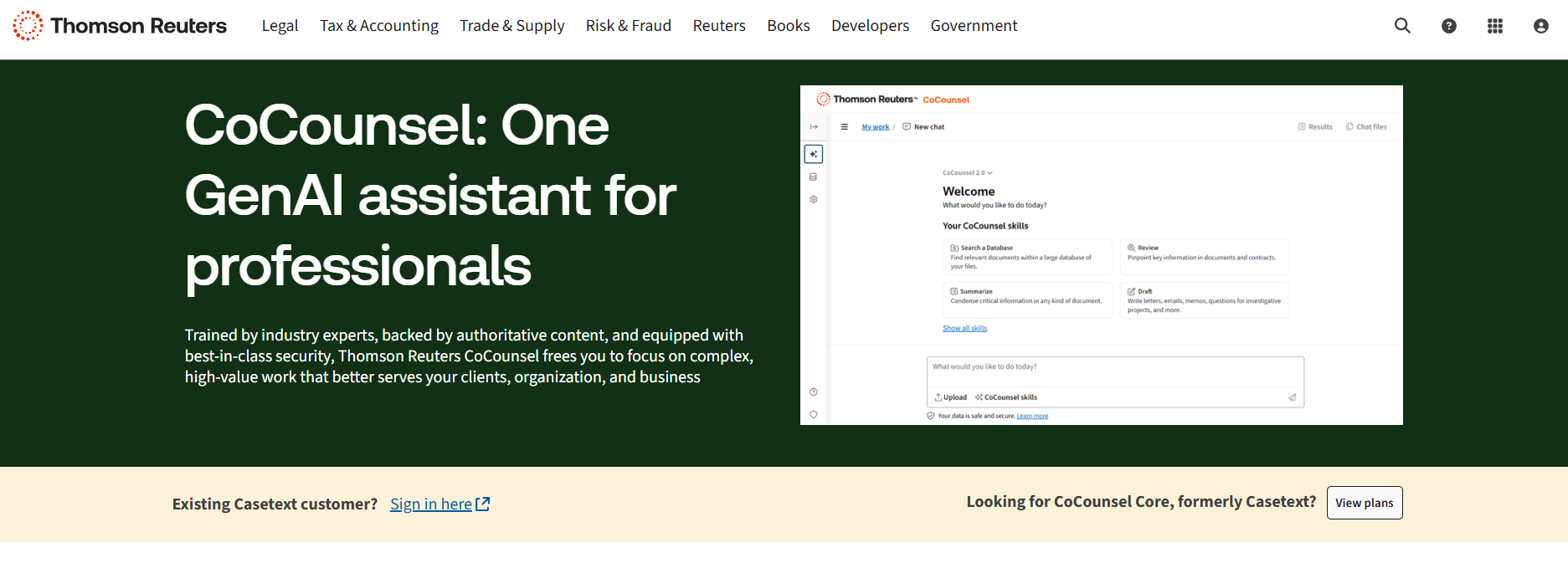
Source: ThomsonReuters.com
The result is greater accuracy in less time. Documents that once took hours to read through can be processed in minutes, and, in turn, this frees attorneys and in-house teams to spend more time on higher-level strategy and client work.
Best Features
- AI document review: Reads and analyzes drafts to highlight risks and gaps.
- Legal document drafting support: Generates clauses and standard agreements when needed.
- Faster turnaround: Handles large volumes of text quickly without sacrificing accuracy.
- Focus on key information: Pulls out the most relevant details for attorneys to act on.
4. PandaDoc
PandaDoc is a document management platform that helps legal teams and business departments handle drafting, approvals, and e-signatures in one place.
While it’s often used for sales contracts and proposals, it also supports legal workflows that require efficiency and clear compliance checks.
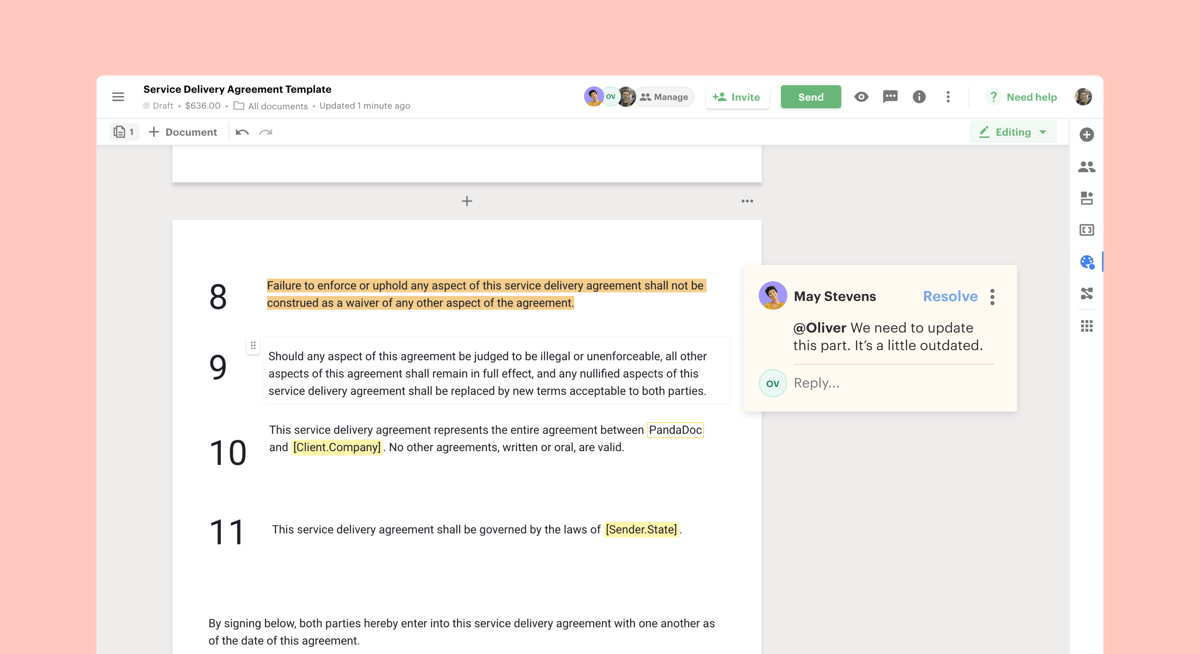
Source: G2
For lawyers, the main benefits come from building contracts faster through drag-and-drop templates and tracking documents once they’re sent out.
Automated processes reduce back-and-forth, and built-in tools for contract analysis give teams a better view of obligations after signing.
Best Features
- Document automation: Create and edit contracts quickly with ready-to-use templates.
- Approval workflows: Route contracts through legal and business teams for faster reviews.
- Compliance tools: Add audit trails and permissions to help ensure compliance.
- Contract analysis: Track terms, signatures, and obligations in real time.
- Integrations: Connects with CRMs, storage apps, and other business systems for smooth legal workflows.
5. Spellbook
Spellbook is an AI drafting assistant that works directly inside Microsoft Word, which makes it a practical option for legal professionals who don’t want to switch to a new platform.

Source: Spellbook.Legal
It helps with legal work by suggesting clauses, spotting gaps, and flagging inconsistencies while you draft. Firms that want to save time while maintaining document accuracy will find it a simple yet powerful add-on.
One of its strengths is how it supports data privacy and compliance. Drafts never leave Word, and AI suggestions are delivered in a way that lets attorneys stay in control of the final text. This approach helps mitigate risk while still giving lawyers the benefits of AI-driven legal documents.
Best Features
- Works inside Microsoft Word: No need to learn a new platform.
- Real-time drafting support: Suggests clauses, edits, and corrections as you write.
- Data privacy focus: Keeps sensitive information secure while you work.
- Risk reduction: Flags missing or inconsistent terms to help mitigate risk.
- Designed for legal professionals: Built specifically around the needs of lawyers and contract drafters.
Briefpoint Rethinks How You Draft Discovery Documents
Legal drafting tools change the day-to-day reality of legal work. They cut down on manual drafting, improve accuracy, and help legal teams keep documents consistent without draining hours.
The real advantage is simple: less time fixing formatting or rewriting the same language, and more time spent on the work that actually requires your judgment.

For litigators, discovery is where the workload can pile up fast. Briefpoint reduces that burden with AI-driven drafting that produces polished responses in minutes while maintaining compliance standards.
Of course, it’s not going to replace your work. Rather, it focuses on removing the parts that slow you down.
If you want a clearer way forward, book a demo today and see how much lighter discovery drafting can feel!
FAQs About Legal Drafting Tools
Can ChatGPT write a legal contract?
ChatGPT can help generate draft language or suggest clauses, but it shouldn’t be relied on as the final version of a contract. Legal professionals still need to review, edit, and approve the document to make sure it meets the client’s needs and complies with the law.
What are the four types of drafting tools?
The main categories include template-based platforms, document automation systems, AI drafting assistants, and contract lifecycle management software. Each supports a different part of legal writing and document workflows.
What software is used to write legal documents?
Lawyers commonly use Microsoft Word alongside specialized legal drafting tools like contract drafting software, discovery document platforms, and AI assistants that improve accuracy and consistency.
What is the most important tool of the legal profession?
The most important tool isn’t just a piece of software; it’s the lawyer’s judgment. Drafting tools support that judgment by handling repetitive tasks, but decisions about strategy, negotiation, and compliance always rest with the attorney.
How can a law firm improve contract drafting?
A law firm can improve contract drafting by using AI tools, template libraries, and automation platforms that cut down on manual work. These tools not only save time but also help maintain consistency and reduce the chance of errors.
The information provided on this website does not, and is not intended to, constitute legal advice; instead, all information, content, and materials available on this site are for general informational purposes only. Information on this website may not constitute the most up-to-date legal or other information.
This website contains links to other third-party websites. Such links are only for the convenience of the reader, user or browser. Readers of this website should contact their attorney to obtain advice with respect to any particular legal matter. No reader, user, or browser of this site should act or refrain from acting on the basis of information on this site without first seeking legal advice from counsel in the relevant jurisdiction. Only your individual attorney can provide assurances that the information contained herein – and your interpretation of it – is applicable or appropriate to your particular situation. Use of, and access to, this website or any of the links or resources contained within the site do not create an attorney-client relationship between the reader, user, or browser and website authors, contributors, contributing law firms, or committee members and their respective employers.
7 Top Legal Research Tools for Law Firms
7 Top Legal Research Tools for Law Firms
Legal work runs on research. Before an argument can be written or a motion filed, someone has to find the right cases, statutes, or regulations. That task can take hours if you’re flipping between websites or relying only on memory.
Plus, we must remember that the law changes constantly. Court rulings shift precedent, legislatures pass new rules, and agencies update guidance. Keeping up matters just as much as knowing where to look in the first place.
This is the major reason why legal research tools have become part of everyday practice. They pull together statutes, U.S. Supreme Court decisions, lower court rulings, legal commentary, and even real-time updates.
With these capabilities, you can focus on one reliable system and get back to the real work.
With all that in mind, let’s take a closer look at what these tools are and the platforms legal professionals rely on most.
What are Legal Research Tools?
Generally speaking, legal research tools are digital resources that help legal professionals conduct legal research with speed and accuracy. They’re diverse, ranging from full-scale databases packed with case law and statutes to platforms that focus on legal news, analytics, or court rules.
While they serve different purposes, the general idea is the same: give users quick access to legal materials they can trust.
Most tools pull from both state and federal courts, along with commentary, practice guides, and regulatory updates. And because the law changes constantly, these platforms also make it easier to stay up to date on new rulings and legislative shifts.
Some of the common features you’ll find include:
- Searchable collections of legal materials such as cases, statutes, and regulations
- Coverage of opinions from state and federal courts
- Citation checkers to confirm the validity of cases
- Built-in legal news updates and analysis
- Filters by jurisdiction, topic, or practice area
- Resources tailored for specific legal fields
In general, legal research tools give professionals one reliable place to research, check, and track information that matters for their work.
Top Legal Research Tools For All Kinds of Law Professionals
There’s no single tool that fits every need. Some platforms focus on deep case law research, while others highlight legal news or analytics. Below, you’ll find a mix of options to choose from:
1. LEGALFLY
LEGALFLY is one of the newer legal research platforms gaining traction with law firms and solo attorneys.
It acts like a modern law library that combines classic legal databases with AI support to speed up searches. Whether you’re reviewing federal and state cases, looking at Supreme Court decisions, or following pending legislation, LEGALFLY brings it all into one system.

Source: G2
It also connects with state court websites to offer quick access to legal opinions and updates across jurisdictions.
Beyond case law, the platform provides legal journals, commentary, and information from administrative agencies, which makes it useful for both statutory research and practice-specific needs.
Best Features
- AI summaries: Breaks down lengthy opinions from federal appellate courts and the Supreme Court.
- Case law coverage: Access to federal and state cases across multiple jurisdictions.
- Statutory research: Tools for finding relevant statutes, rules, and regulations.
- Secondary sources: Integration with legal journals and commentary for deeper context.
- Legislative tracking: Updates on pending legislation and new rulings from administrative agencies.
Pros
- Saves time with clear summaries of cases and statutes
- Strong mix of statutory research, case law, and secondary sources
- Connects to both state court websites and federal rulings
- Fits the needs of both large law firms and smaller practices
2. Lex Machina
Lex Machina is designed for legal experts who need more than just case law. It provides litigation analytics that help shape strategy.
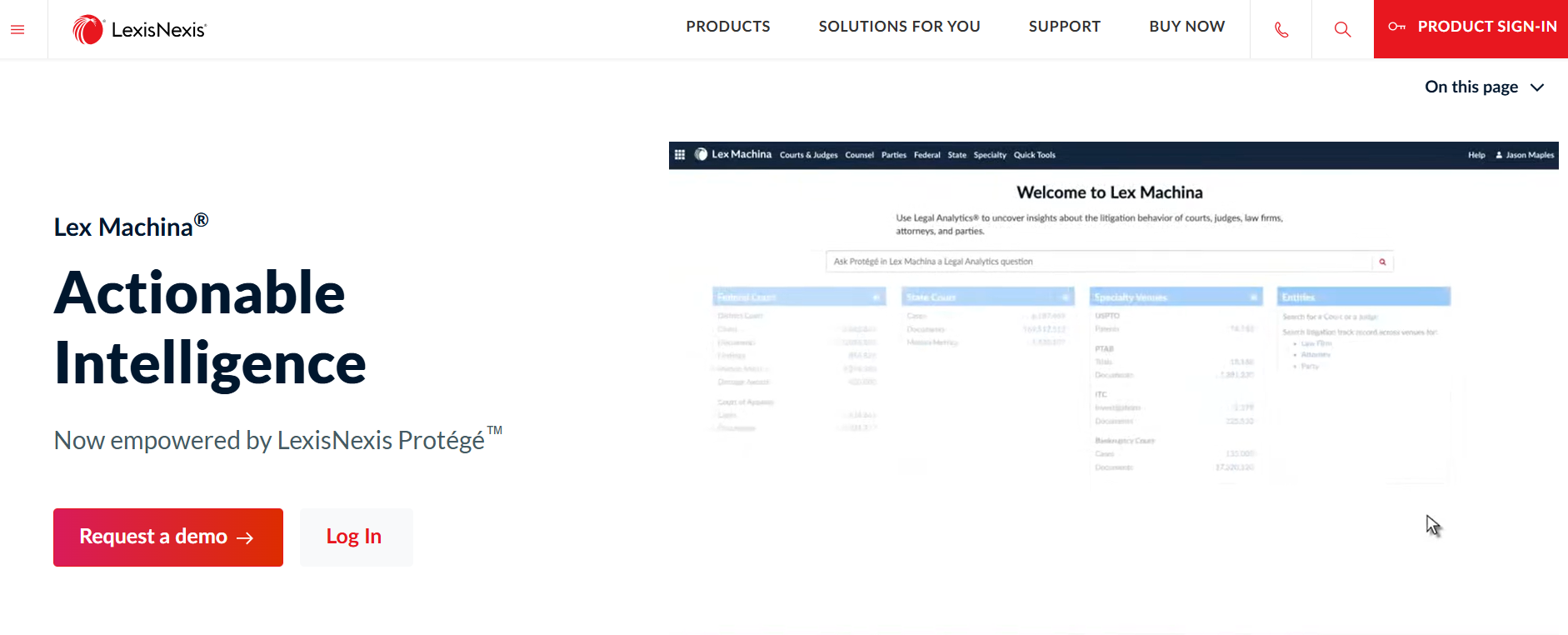
Source: LexisNexis.com
Rather than rifling through a basic searchable database, this platform digs deeper into trends. It can show how judges, courts, and even opposing counsel have handled similar legal issues in the past.
It’s especially valuable for firms that want to prepare with data, not guesswork. Alongside analytics, Lex Machina also gives access to case documents, statutes, and references like law review articles or notes from the Law Revision Counsel.
Best Features
- Litigation analytics: Detailed data on judges, lawyers, law firms, and case outcomes.
- Searchable database: Quick access to case law, filings, and related legal issues.
- Federal regulations: Coverage of statutes and rules that impact case outcomes.
- Secondary resources: References to law review articles and other commentary.
- Historical insights: Information from the Law Revision Counsel and long-term case patterns.
Pros
- Helps predict outcomes with data-backed insights
- Saves time preparing case strategies with detailed analytics
- Strong support for complex legal issues and multi-jurisdiction cases
- Widely used by large firms and litigation-focused attorneys
3. Bloomberg Law
Bloomberg Law is a well-known choice among legal experts and a go-to for both practitioners and the occasional law student who wants deeper insights.
Unlike free legal resources that only cover the basics, Bloomberg offers a vast mix of case law, statutes, and business-focused updates.

Source: BloombergLaw.com
You’ll find everything from Supreme Court opinions and case summaries to commentary pulled from legal blogs, practice guides, and even a built-in legal dictionary for quick reference.
While some platforms rely only on raw case law, Bloomberg combines traditional databases with news-driven updates to help professionals keep up with both legal and business trends. It also pulls from open-access journals, which gives researchers additional context alongside standard materials.
Best Features
- Comprehensive coverage: Access to statutes, Supreme Court opinions, and detailed case summaries.
- News integration: Ongoing updates that connect legal developments with business and finance.
- Secondary resources: Includes references from legal blogs, practice guides, and open-access journals.
- Research support: Built-in legal dictionary and tools designed for practicing attorneys and law students.
- Case tracking: Alerts on dockets, filings, and emerging case law.
Pros
- Strong mix of legal research and business intelligence
- Includes resources beyond traditional case law, like legal blogs and journals
- Helpful for both practicing attorneys and law students
- Reliable case summaries that speed up research
4. Legal Information Institute
The Legal Information Institute (LII), hosted by Cornell Law School, is one of the most trusted free legal research tools available online. It gives open access to a broad range of legal documents, including statutes, regulations, and U.S. Supreme Court decisions.
For many in the legal industry, this platform is the first stop when they need reliable information at no cost.
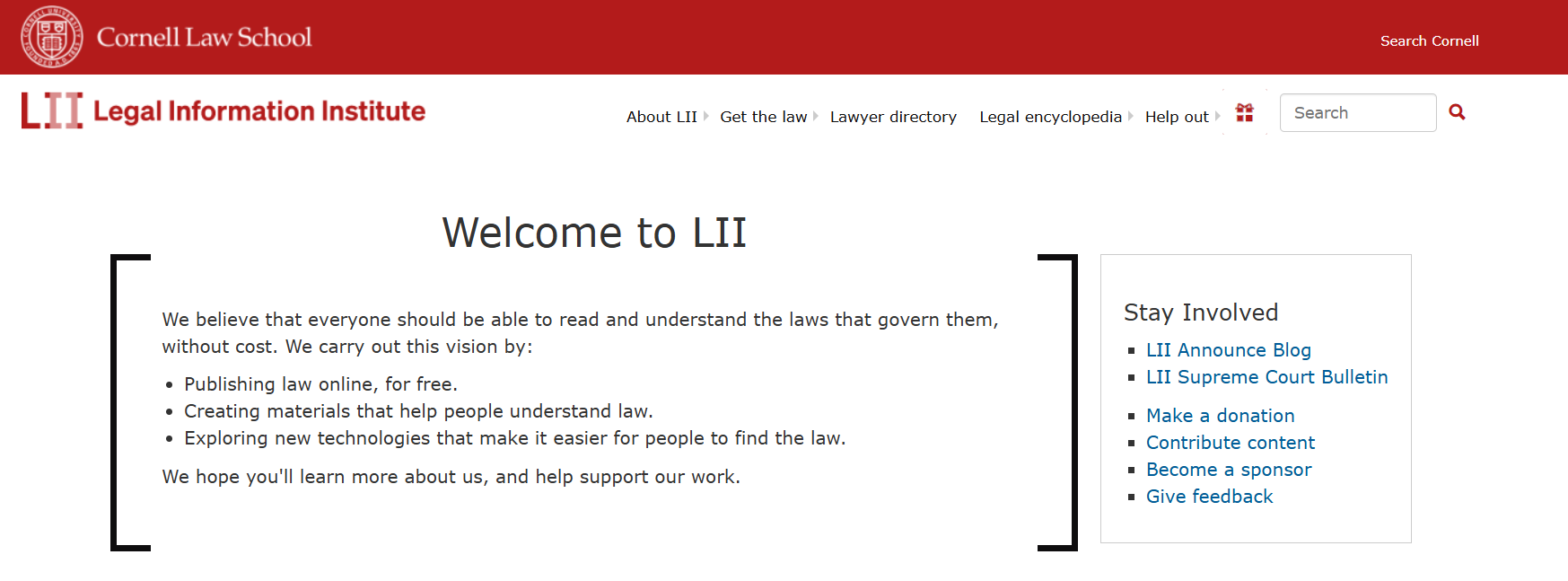
Source: Law.Cornell.edu
What sets LII apart is its focus on free legal research. Users can browse legislative materials, check congressional records, and search through an extensive collection of federal and state resources.
Sadly, it doesn’t have advanced analytics like paid platforms, but it’s a go-to for anyone who needs dependable and straightforward legal information.
Best Features
- Free access: Open-source platform for statutes, case law, and U.S. Supreme Court decisions.
- Extensive collection: Covers legislative materials, congressional records, and key rulings.
- Educational support: Simple guides and explanations for students and non-lawyers.
- Trusted source: Backed by Cornell Law School, respected across the legal industry.
- User-friendly design: Easy to search and navigate compared to many traditional systems.
Pros
- 100% free and accessible to anyone
- Broad coverage of cases, statutes, and legislative materials
- Respected academic source with a strong reputation
- Useful for both professionals and the general public
5. Fastcase (Now vLEx)
Fastcase, now vLex, is a practical option for lawyers who want an affordable yet reliable research tool. Many state bar associations even provide it as a member benefit, which makes it one of the most widely available legal research platforms.
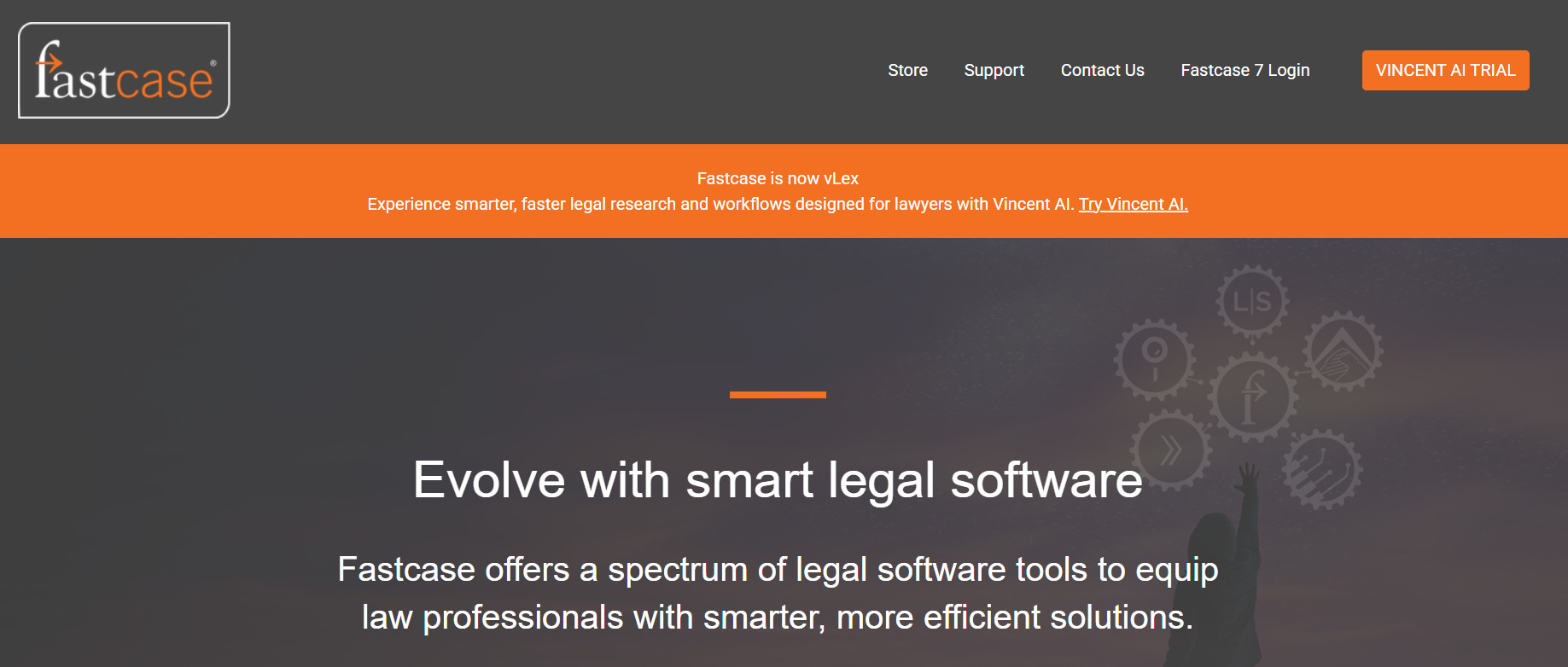
Source: Fastcase.com
Essentially, it covers a wide range of federal cases and state decisions to give attorneys quick access to rulings that matter for their work.
On top of its large database, Fastcase includes advanced search options that help users find relevant rulings quickly. It also provides practice tips and visualization tools, so lawyers can see how cases connect and build stronger arguments.
Best Features
- Federal cases: Broad coverage of rulings from across the country.
- Advanced search options: Filters and tools to refine case law research with precision.
- Visualization tools: Graphs and maps showing how cases are linked.
- Mobile access: Research from anywhere with the Fastcase mobile app.
- Practice tips: Contextual guidance that supports decision-making.
Pros
- Affordable option, often included in bar memberships
- Easy-to-use design with mobile support
- Strong database of both state and federal cases
- Helpful extras like practice tips and visualization tools
6. Caselaw Access Project
The Caselaw Access Project (CAP) is one of the most ambitious free legal research resources available today. Backed by Harvard Law School, it gives open access to millions of U.S. court decisions, including historic rulings and modern opinions.
For researchers, law students, and those with a legal scholarship, CAP is a powerful way to study how the law has evolved over time.
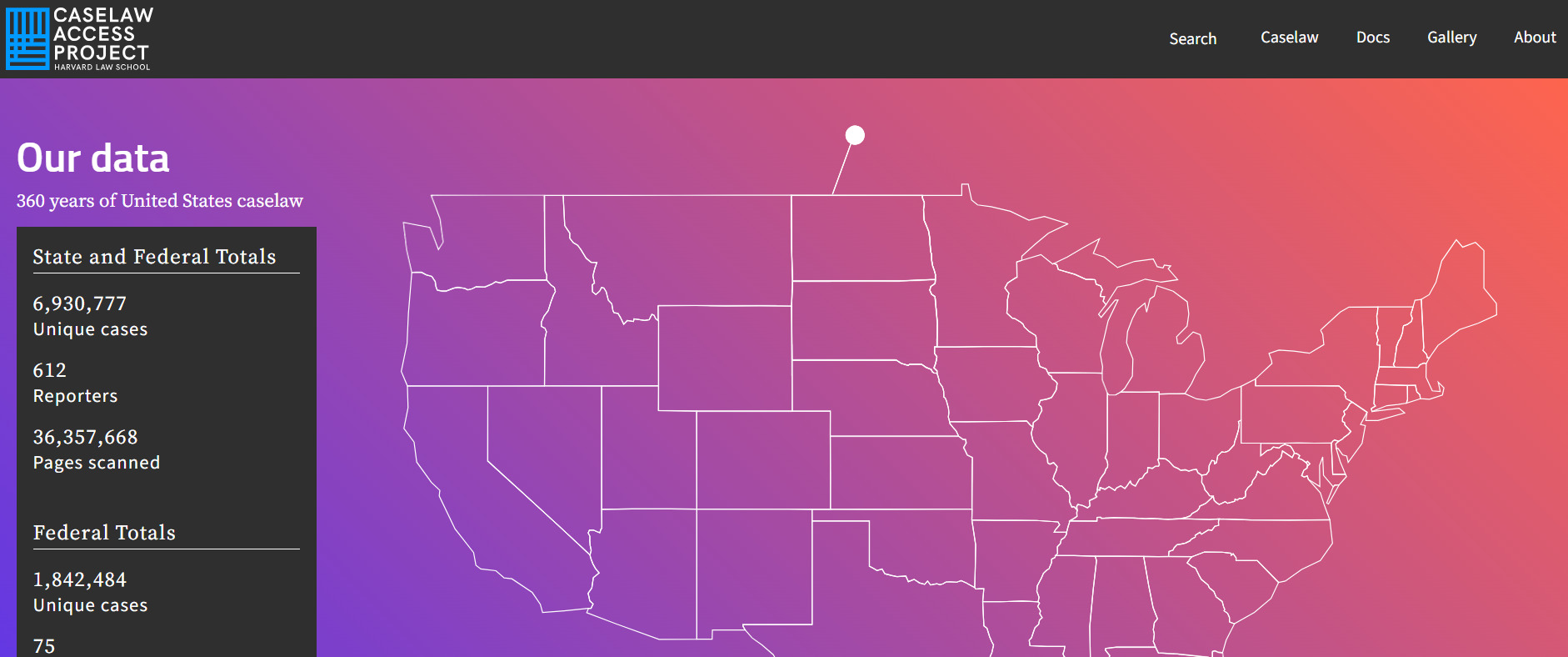
Source: Case.law
The database spans everything from U.S. Supreme Court decisions to state-level rulings, organized by report volume number for accuracy.
While the basic platform is free, CAP also offers paid desktop plans with additional features like bulk downloads and advanced search. It’s widely recognized by groups like the American Bar Association for its value to both academics and practitioners.
In addition to case law, the project gives access to session laws and related materials, which makes it a strong complement to other research tools.
Best Features
- Extensive coverage: Millions of cases, including U.S. Supreme Court decisions and state rulings.
- Reports volume number: Organized referencing for precise case identification.
- Free access: A strong choice among free legal research resources.
- Paid desktop plans: Options for bulk downloads and advanced research features.
- Legal scholarship support: Widely used for studies, journals, and academic work.
Pros
- Open access for researchers, lawyers, and students
- Valuable for legal scholarship and historical studies
- Endorsed by the American Bar Association as a trusted resource
- Combines free use with optional upgrades for professionals
7. Paxton AI
Paxton AI is an emerging tool built to support both attorneys and law firms with faster, AI-driven research.

Source: Paxton.ai
Unlike traditional law library systems, Paxton uses natural language processing to interpret questions in plain English and deliver precise results from statutes, federal and state cases, and legal opinions.
What makes it stand out is how it ties traditional legal databases with modern features like real-time tracking of pending legislation and integration with secondary sources such as legal journals.
This balance makes it useful not only for practicing lawyers but also for students who want a more approachable way to conduct legal research.
Best Features
- AI-powered search: Responds to plain language questions and provides targeted case law and relevant statutes.
- Federal and state coverage: Access to rulings from multiple jurisdictions, including appellate and trial courts.
- Pending legislation tracking: Alerts on proposed laws and regulatory changes.
- Secondary materials: References from legal journals and practice commentaries.
- Citation support: Tools to verify and cross-check legal opinions.
Pros
- Speeds up research with AI-generated responses
- Covers both federal and state cases in one platform
- Helpful for smaller law firms looking for cost-effective options
- Combines traditional research with real-time legislative updates
From Research to Ready-to-Serve Documents With Briefpoint
Using legal research tools gives you the knowledge you need, but turning that research into finished discovery documents can still feel like a grind.
Hours spent drafting the same objections, formatting responses, and double-checking consistency take away from time you’d rather put into strategy… or just having a normal evening.

This is what Briefpoint was built to fix. With Briefpoint, you upload requests, add your objections and responses, and within minutes, you’ve got drafts ready to download, sign, and serve.
The software uses secure, litigation-grade AI to suggest content, apply firm standards, and keep everything consistent across your team.
Lawyers using Briefpoint save an average of 87% of their time on discovery documents. It works with tools you may already rely on, and it’s backed by SOC-2 certification and HIPAA compliance, so your client data is protected.
If you’ve ever thought, “There has to be a faster way to get this done,” there is. Book a demo with Briefpoint and find out how much time you can save.
FAQs About Legal Research Tools
What tools do legal researchers use?
Legal researchers often use platforms like LexisNexis, Westlaw, CaseText, Bloomberg Law, and Fastcase. Many also rely on free online legal content from sources like the Legal Information Institute or government sites for quick access to statutes, rules, and court decisions.
What is the best legal research software?
The “best” software depends on your needs. For large firms, comprehensive systems like Bloomberg Law or LexisNexis are strong choices. Smaller practices may prefer Fastcase or CaseText for affordability. Specialists in areas like family law may also choose tools with practice-specific resources.
Is Westlaw or Lexis better for legal research?
Both are widely respected and cover a broad scope of legal information, including statutes, U.S. Supreme Court decisions, and secondary sources. LexisNexis is often praised for Shepard’s citation service, while Westlaw offers powerful search features and deep coverage across practice areas.
Which is the best database for legal research?
For comprehensive coverage, LexisNexis, Westlaw, and Bloomberg Law are leading options. If you’re looking for something free, the Legal Information Institute provides access to statutes and rulings. Many researchers also use databases maintained by the Administrative Office of the U.S. Courts for direct federal materials.
The information provided on this website does not, and is not intended to, constitute legal advice; instead, all information, content, and materials available on this site are for general informational purposes only. Information on this website may not constitute the most up-to-date legal or other information.
This website contains links to other third-party websites. Such links are only for the convenience of the reader, user or browser. Readers of this website should contact their attorney to obtain advice with respect to any particular legal matter. No reader, user, or browser of this site should act or refrain from acting on the basis of information on this site without first seeking legal advice from counsel in the relevant jurisdiction. Only your individual attorney can provide assurances that the information contained herein – and your interpretation of it – is applicable or appropriate to your particular situation. Use of, and access to, this website or any of the links or resources contained within the site do not create an attorney-client relationship between the reader, user, or browser and website authors, contributors, contributing law firms, or committee members and their respective employers.
Paralegal Drafting and Document Automation Tools
Paralegal Drafting and Document Automation Tools
Legal work moves fast, and there’s often more to do than hours in the day. Paralegals help keep it all on track. From prepping court filings to organizing case details, they handle the kind of work that keeps everything running behind the scenes.
One of their most important roles? Drafting legal documents.
But what exactly can paralegals draft? Where’s the line between support and legal practice? And how does document automation fit into all of this?
This guide breaks it all down: what paralegals do, what they don’t, and how the right tools can make their work smoother, faster, and more accurate.

What Is A Paralegal And What Do They Do?
A paralegal is a legal professional who works under the supervision of a lawyer to support legal tasks. They’re not licensed to practice law, but they’re trained to handle a variety of responsibilities that help law firms, corporations, and government agencies run smoothly.
From legal research to document prep, paralegals are trusted with a big part of the workload. They must follow strict rules and can’t offer legal advice, but they still play a key role in legal services by taking care of the behind-the-scenes work that keeps cases moving forward.
Common Tasks Paralegals Handle
Paralegals juggle a mix of duties that keep legal teams organized and efficient. Here’s what they typically do:
- Draft legal documents like contracts, discovery responses, and pleadings.
- Research laws and case history to help lawyers build their arguments.
- Organize case files and maintain document management systems.
- Handle client communication under supervision, such as scheduling or updates.
- File paperwork with courts and agencies on time.
- Prepare trial materials like summaries, timelines, and exhibit lists.
- Review documents for accuracy and completeness.
While they can’t represent clients or provide legal advice, paralegals help lawyers focus on strategy by taking care of the groundwork.
Can Paralegals Draft Legal Documents?
Yes, paralegals can draft legal documents, but there are clear boundaries. They’re allowed to prepare documents as long as a licensed attorney supervises and approves the final versions.
This means paralegals can take on much of the initial drafting work, which saves a lot of time. However, they can’t act independently or offer legal advice during the process. Every document they prepare must ultimately be reviewed and signed off by the supervising attorney.
The rules vary slightly depending on the state or country, but the general idea is the same: paralegals can assist with document preparation but can’t replace a lawyer’s judgment or authority.
Drafting contracts, pleadings, affidavits, and other legal materials is part of their regular workflow, especially in busy law firms. Still, it’s important to remember that clients can’t rely solely on paralegals for legal documents without lawyer involvement.
At the end of the day, lawyers are held responsible for the legal accuracy and quality of all documents that come out of their office, even if a paralegal does the bulk of the work behind the scenes.
What Kind Of Documents Can Paralegals Draft?
Paralegals are trained to support lawyers by preparing various legal documents that play a big role in legal proceedings. While they can’t finalize documents without a lawyer’s review, they handle much of the legal document drafting work to help move cases forward efficiently.
They often rely on legal research databases to gather accurate information and ensure the documents are complete and well-informed.
Plus, the drafting process involves using templates, reviewing past cases, and double-checking facts to create legally sound documents.
Here are some of the most common types of legal documents paralegals draft:
- Contracts – Employment agreements, service contracts, non-disclosure agreements.
- Pleadings – Complaints, answers, motions, and other court filings.
- Discovery documents – Interrogatories, requests for production, and responses.
- Affidavits and declarations – Written statements sworn to be true under oath.
- Wills and trusts – Basic estate planning documents prepared under lawyer supervision.
- Settlement agreements – Used to resolve disputes before or during legal proceedings.
- Legal correspondence – Letters to clients, opposing counsel, or court personnel.
- Case summaries and timelines – Used to support trial prep and presentations.
As you can see, paralegals play a key role in the drafting process. Essentially, they help lawyers create various legal documents that are accurate, organized, and legally sound.
What Is The Role of Document Automation?
If you’ve ever had to draft the same type of legal document more than once, you know how repetitive it can get. Document automation helps cut down on all that manual work.
Contrary to what some professionals might think, it’s not some high-tech tool only used by massive firms. It’s actually built for everyday tasks paralegals deal with, like filling in names, dates, and clauses that don’t really change all that much.
So, how did it all start?
Legal teams have always looked for ways to save time and avoid mistakes. At first, it was just copy-pasting from old files. Then came templates. But even that got messy when things had to be updated over and over again.
That’s when document automation took off. Its goal is to help you build a solid draft without the back-and-forth and without missing key details.
Here’s how it works: you answer a few basic questions (or fill out data fields or upload your document for scanning), like the client’s name, key dates, or terms, and the software fills out the document for you. It uses preset templates built by your team and pulls info from your system or even legal research databases.
The bottom line: It’s much like a smart assistant that already knows the format, the language, and what goes where. Legal professionals and paralegals stay in control, but with less busywork.
What Are The Benefits of Legal Document Automation?
Legal document automation has changed how legal teams handle paperwork. What used to take hours can now be done in minutes.
For paralegals, especially, it means spending less time on repetitive tasks and more time on work that actually needs their input. So, how does this shift affect the way you work? Let’s break it down.
Saves Time on Repetitive Tasks
Automation tools take care of the busywork by using pre-built templates and pulling info from forms, legal databases, or past cases.
Instead of typing out the same clauses, headings, and legal terms over and over, you simply enter the case-specific details, and the system handles the rest.
That means you can spend less time on formatting and more time reviewing the final product or conducting legal research when needed. It also makes legal writing faster and less tiring, particularly when working under tight deadlines, ultimately reducing paralegal burnout.
Here’s how it helps:
- Fills in standard legal language automatically
- Pulls client data directly from legal databases
- Reduces time spent rewriting the same documents
- Keeps formatting and structure consistent across drafts
Cuts Down on Errors
Manual document drafting often leads to simple but costly mistakes like typos, wrong dates, missing sections, or inconsistent formatting. These errors might seem small, but in legal disputes, they can cause delays or even hurt a client’s case.
Document automation helps avoid these issues by using templates with standard language and pulling case details directly from trusted systems.
For example, instead of retyping the same discovery response in multiple places, a legal assistant can enter the information once, and the system applies it across the entire document.
Paralegal education programs now include training on these tools, knowing how important they’ve become in everyday legal processes. When used correctly, automation supports the quality of legal writing and reflects the kind of attention to detail expected in the profession.
It allows paralegals and legal assistants to focus more on thorough legal research and case strategy rather than fixing the same errors again and again.
Keeps Work Organized
Staying organized is one of the biggest challenges in a busy legal practice. When you’re handling several matters at once, it’s not hard for things to get scattered. Unfortunately, these small issues can quickly slow things down or lead to mistakes.
Document automation helps avoid that by keeping everything in one place. Templates, drafts, and final versions are easy to find, clearly labeled, and tied to the right case. You can see who last made edits, what’s been changed, and what still needs review.
Here’s how it helps:
- Keeps documents organized and easy to track
- Connects each draft to the right matter automatically
- Reduces back-and-forth between team members
- Makes sure each document reflects the most up-to-date information
Great organization goes a long way. By keeping the drafting process clear and structured, automation helps you stay on top of the details and support more successful legal outcomes.
Improves Consistency Across the Board
The legal landscape demands clear, consistent communication. Whether one person or several are involved in drafting, every document needs to match in tone, structure, and formatting.
Document automation helps maintain consistency by using shared templates that apply the same standards across the board.
For example, if two legal assistants draft similar pleadings without automation, one might include case law references while the other skips them. That inconsistency can be confusing or even hurt the case.
Automation keeps everything aligned, which makes it easier to present polished, professional documents every time.
Document Automation: Best Practices For Paralegals
Using document automation the right way can make your day a lot smoother. When used correctly, automation supports your role and helps you avoid mistakes that can slow things down later.
If you’re a paralegal looking to get the most out of automation tools, there are a few simple habits that can make a big difference.
1. Start With Clean, Approved Templates
One of the most essential skills in legal document drafting is knowing where to start, and that means using the right template. Whether you’re drafting pleadings, contracts, or discovery responses, always begin with a template that’s been reviewed and approved by your legal team.
These templates follow firm-specific formatting, use the correct legal language, and stay in line with procedural rules. Using an outdated or unofficial version can lead to errors that take extra time to fix.
If there’s any doubt, check with a supervising attorney or senior paralegal to make sure you’re working from the most current version.
2. Review Every Output Before It Leaves Your Desk
In the legal field, attention to detail is non-negotiable. Even if automation tools do most of the work, it’s still your responsibility to make sure the document complies with formatting rules, legal standards, and case-specific details.
Always review the output carefully. Check for missing names, incorrect dates, or formatting that doesn’t match the firm’s expectations. These small mistakes can easily slip through if you rely too heavily on the tool.
Remember: solid drafting skills aren’t just about writing; they’re also about knowing when something doesn’t look right.
3. Don’t Skip the Legal Review
No matter how advanced the software is, an automated draft is never the final version. It still needs a lawyer’s approval before it’s ready to go.
Even if the document looks complete, a supervising attorney needs to confirm that it meets legal standards and serves its purpose. Your role is to make sure the draft is clean, accurate, and easy to review.
This mindset reflects the kind of professionalism that law school teaches and supports your long-term professional development. A careful review can make all the difference in a document’s effectiveness.
4. Stay Updated on the Tools You Use
Automation tools are always evolving. New features, improved templates, and system updates roll out regularly. So, staying current with those changes helps you work more efficiently. Taking a few minutes to explore new options or read internal tips can save you time in the long run.
For example, Briefpoint regularly updates its platform and adds smart features designed to make legal drafting even smoother. We also publish helpful blogs and cheat sheets that explain how to get the most out of the tool.
5. Use Notes and Comments When Needed
Not every draft will be perfect on the first try, especially when it involves key aspects of a case that require legal interpretation or specialized knowledge.
If you’re unsure about a clause, a date, or how to phrase something specific to the parties involved, don’t guess. Add a clear comment or note for the reviewing attorney.
This kind of communication shows you’re paying attention and thinking through the details. Experienced paralegals know that leaving helpful notes not only speeds up the review process but also builds trust with attorneys who rely on clean, thoughtful drafts.
Brieftpoint Helps Your Paralegals Be Even More Efficient
Paralegals don’t need more software. They need tools that actually reduce the back-and-forth.
Briefpoint is built for one purpose: helping legal teams draft and respond to discovery documents faster and with fewer errors. It handles Interrogatories, Requests for Admission, and Requests for Production.

Here’s how it works: Upload a PDF of your complaint or opposing counsel’s requests. Briefpoint scans the document, extracts key info like court name and request type, and formats everything based on local rules.
You can then add objections or client responses with just a few clicks. With Briefpoint Bridge, it’s also easy to collect your clients’ responses. Finally, download the draft in Word for final review. That’s hours of work squeezed into just a few minutes.
If your team is ready to move faster without cutting corners, Briefpoint can help you get there.
Want to see how it works in real time? Book a demo today.
FAQs About Paralegal Drafting Documents
Do paralegals draft legal documents?
Yes, paralegals often draft legal documents under the supervision of a licensed attorney. They assist with pleadings, contracts, discovery responses, and more, making sure each document meets its intended purpose. While they can’t sign or finalize these documents, they play a key role in preparing them.
What are three things a paralegal cannot do?
Paralegals cannot give legal advice, represent clients in court, or sign legal documents on behalf of an attorney. These tasks are reserved for licensed lawyers. Even with a paralegal certificate, supervision is required for all legal work.
Can anyone draft a legal document?
Technically, yes, but without legal training, there’s a high risk of errors. Drafting legal documents requires a clear understanding of the law, proper structure, and procedural rules. Paralegals support this process with thorough research, attention to detail, and knowledge of legal formatting.
Who drafts legal documents?
Legal documents are typically drafted by attorneys or paralegals. Paralegals handle much of the early drafting work, especially when it involves organizing facts, applying standard language, or interviewing witnesses to gather valuable insights. Final approval always rests with the attorney.
The information provided on this website does not, and is not intended to, constitute legal advice; instead, all information, content, and materials available on this site are for general informational purposes only. Information on this website may not constitute the most up-to-date legal or other information.
This website contains links to other third-party websites. Such links are only for the convenience of the reader, user or browser. Readers of this website should contact their attorney to obtain advice with respect to any particular legal matter. No reader, user, or browser of this site should act or refrain from acting on the basis of information on this site without first seeking legal advice from counsel in the relevant jurisdiction. Only your individual attorney can provide assurances that the information contained herein – and your interpretation of it – is applicable or appropriate to your particular situation. Use of, and access to, this website or any of the links or resources contained within the site do not create an attorney-client relationship between the reader, user, or browser and website authors, contributors, contributing law firms, or committee members and their respective employers.
5 In-House Legal Software Every Law Firm Should Use
5 In-House Legal Software Every Law Firm Should Use
Is your legal team spending too much time on routine tasks? If managing contracts, drafting documents, or tracking case details feels more complicated than it should, you’re not alone. Many firms face daily bottlenecks that slow down productivity and increase the risk of mistakes.
In-house legal software offers a more efficient way to manage operations. From document generation to contract tracking and billing, the right tools can reduce manual work, improve accuracy, and help your team stay organized.
In this article, we’ll walk through five essential types of in-house legal software and explore how they support a smoother, more efficient legal workflow.

Types of Software In-House Legal Teams Need
An efficient legal team doesn’t rely on manual processes alone. It uses technology to reduce friction, increase visibility, and keep everything moving. With the right tools, legal departments can spend less time on repetitive administrative tasks and more time focusing on high-impact legal work.
Below are some of the best legal tech tools that make way for smoother, faster, and more cost-effective legal operations.
1. Document Generation Tools
Creating legal documents is a staple task for any legal team, but it often consumes too much time and resources when done manually.
Document generation tools automate this process and allow faster creation of legal documents from pre-set templates.
That means you can create documents much faster and worry less about mistakes slipping through. Everything stays consistent from one file to the next.
Such tools can produce everything from routine correspondence to complex legal agreements, all while ensuring compliance with the latest legal standards.
Top Pick: Briefpoint
Briefpoint uses generative artificial intelligence to help legal teams draft discovery responses and request documents in minutes.
This platform lets you upload your discovery document, insert objections or responses, and then finish up the document in Word. Briefpoint will take care of everything in between.

Additionally, Briefpoint’s Bridge feature makes client communication easier by converting legal terms into simple language, allowing clients to respond directly. Their responses are automatically added to your document, cutting down on the typical email exchanges.
The process is easy, even for people with limited technical skills, and it frees up attorneys to focus on other valuable tasks like consulting with outside counsel or preparing litigation strategies.
Plus, the time saved often translates to more money saved as well.
Test Briefpoint yourself by scheduling a demo here.
2. Contract Management Software
Contract workflows often slow down legal teams. For corporate legal departments managing high volumes of contracts, this isn’t just inconvenient. An inefficient contract lifecycle creates risk and delays across the business.
Contract management software brings structure to the entire process. From initial drafting and negotiation to approvals, execution, and renewals, everything lives in one place.
Built-in features typically include:
- Version control so you can track edits and see what’s changed over time
- Automated reminders to help you stay on top of key dates and approval deadlines
- Secure storage for easy, reliable access to documents without compromising security
You can also assign legal requests directly within the platform, which helps eliminate confusion around ownership and keeps legal processes moving. Instead of juggling documents over email or tracking updates in spreadsheets, your team can manage contracts with more clarity and speed.
Top Pick: Ironclad
Ironclad is a must-have for any legal department that needs to handle everything contract-related. It smooths out the whole process, from start to finish, with some smart automation tricks up its sleeve.
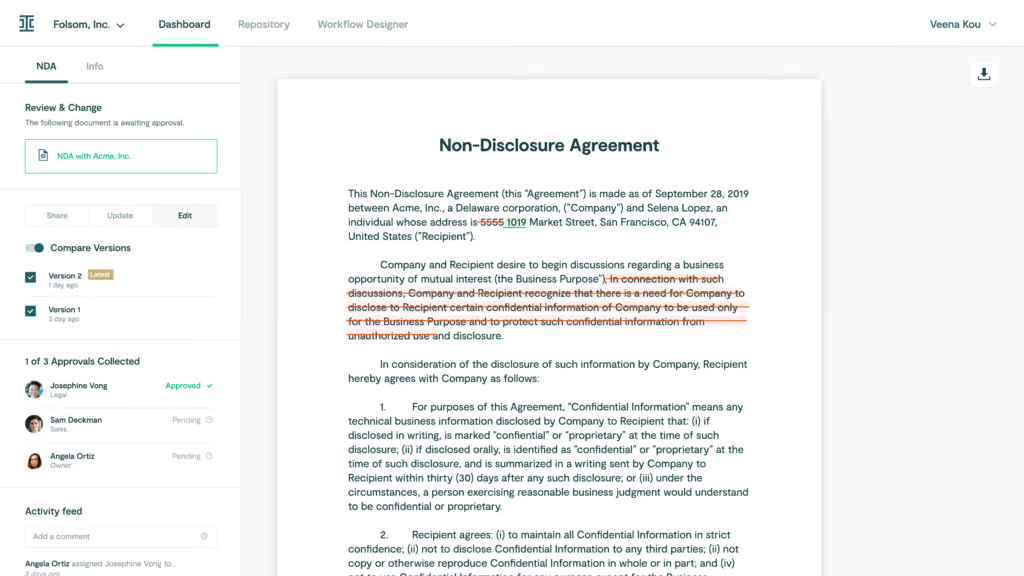
Image source: G2
Its analytics feature lets you evaluate how your contracts move through the pipeline, identify delays, and improve decision-making with real-time data.
You can also set up routing rules to assign legal requests efficiently and keep everyone aligned on the status of each document.
3. Document Management Systems
Legal operations always go hand in hand with a ton of paperwork, which is why any in-house counsel can benefit from a good document management tool.
Document management systems allow for quick retrieval, controlled access, and efficient collaboration on documents, and make sure that everything is both safe and easily accessible.
They also support data security by offering encryption, compliance controls, and audit trails, which are especially important when handling sensitive legal matters or managing contract renewals.
Legal leaders can control who sees what, track changes, and collaborate on documents without creating a dozen versions.
These systems also help automate routine tasks, like organizing files or routing documents for review, so teams can respond faster to internal clients and reduce time spent on manual admin work.
Top Pick: NetDocuments
NetDocuments is a cloud-based document management system designed specifically for legal teams. It offers secure storage, easy access from anywhere, and robust tools for collaboration and document handling.
Image source: G2
It’s known for top-notch security features and compliance with international standards, which makes it a safe bet for managing sensitive legal matters and maintaining strong data security across the board.
4. Matter Management Software
Matter management software is a one-stop shop for legal teams to keep their cases and projects in line.
It pulls together all the bits and pieces related to a case—documents, emails, deadlines, and more—into one spot that’s easily accessible through a secure platform.
It makes task management and legal workflows much easier by automating administrative tasks, keeping an eye on key dates, and making sure internal and external stakeholders are in the loop.
Legal teams also gain complete control over how matters are tracked and handled, from resource allocation to communications, helping them stay organized and responsive. As a result of the extra operational efficiency, in-house legal teams have more time to work on more complicated legal work.
Top Pick: Clio
Clio is a comprehensive, cloud-based legal practice management platform that’s really made a name for itself in the legal world for being able to streamline processes for law firms of all sizes.

Image source: G2
With Clio, you can manage cases, track time, bill clients, and organize all your legal documents in one place.
It also has excellent features for legal intake, client communication, and scheduling, which makes it easier to keep everyone informed and on track.
Plus, Clio allows you to analyze key performance indicators with its analytics and reporting tools. This helps firms make data-driven decisions, track productivity, and identify areas for improvement across their legal operations.
5. Legal Billing Tools
Efficient and accurate billing is a must if a law firm wants to remain profitable.
Legal billing tools help you:
- Track billable hours accurately
- Manage client accounts more easily with all the details in one place
- Generate detailed invoices that follow client billing guidelines from the start
One of the key features of legal billing software is time tracking. Whether you’re working on a case, consulting with a client, or doing research, these tools make it easy to record every billable minute.
Also, they often come with functionalities to handle expense tracking and generate reports that can help guide business decisions and improve overall efficiency.
Top Pick: QuickBooks
Lawyers can leverage QuickBooks to track billable hours directly within the software, maintain accurate invoicing, and simplify the process of billing clients.
The platform also allows for the management of client trust accounts, a critical aspect of legal financial management.

Source: QuickBooks.Intuit.com
Additionally, QuickBooks helps law firms with general accounting tasks, such as tracking expenses, managing payroll, and producing financial reports.
These features provide a clear overview of a firm’s financial health, which often leads to data-driven decisions.
Upgrade Your Productivity With the Right In-House Legal Software
Using the right in-house legal software can truly transform the way your firm operates.
From automating document creation to managing contracts and keeping everything organized, these tools make legal work smoother and more efficient.
Ready to boost your productivity? Try Briefpoint! With faster document drafting and simplified client communication, you’ll save time and reduce unnecessary back-and-forth.
Schedule your demo today and see how Briefpoint can make a difference for your team.
FAQs About In-House Legal Software
Can small legal teams benefit from in-house legal software?
Yes. Size doesn’t limit the impact of better systems. These tools are scalable and can significantly reduce the workload for small teams. They also support seamless communication and help boost efficiency across daily operations.
Is it secure to store sensitive legal documents in these systems?
Yes, with a caveat. Make sure the software complies with industry-standard security measures and data protection laws. Reputable providers prioritize data security, especially when dealing with sensitive client information and confidential legal documents.
Can in-house legal software integrate with other tools we use?
Most modern legal software solutions are built with integration in mind. They typically support APIs and offer native integrations with widely used office tools, making it easier to connect systems and maintain seamless communication across departments.
What other in-house legal software do law firms need?
In addition to the tools already mentioned, case management software is a must for law firms. It allows teams to organize case details, manage deadlines, increase team performance, and streamline collaboration so that all relevant information is easily accessible (without having to handle multiple systems). Finally, legal research software can significantly cut down the time spent on case law and regulation searches, providing faster access to relevant legal information.
The information provided on this website does not, and is not intended to, constitute legal advice; instead, all information, content, and materials available on this site are for general informational purposes only. Information on this website may not constitute the most up-to-date legal or other information.
This website contains links to other third-party websites. Such links are only for the convenience of the reader, user or browser. Readers of this website should contact their attorney to obtain advice with respect to any particular legal matter. No reader, user, or browser of this site should act or refrain from acting on the basis of information on this site without first seeking legal advice from counsel in the relevant jurisdiction. Only your individual attorney can provide assurances that the information contained herein – and your interpretation of it – is applicable or appropriate to your particular situation. Use of, and access to, this website or any of the links or resources contained within the site do not create an attorney-client relationship between the reader, user, or browser and website authors, contributors, contributing law firms, or committee members and their respective employers.
8 Best Legal Document Automation Software For 2025
8 Best Legal Document Automation Software For 2025
Legal work is filled with routine, time-consuming paperwork, but it no longer has to be.
Thanks to advances in software and AI, law firms can now automate repetitive tasks like drafting and formatting legal documents. In turn, it frees up attorneys and staff to focus on strategy, client service, and high-impact work.
But with so many tools on the market—and not every lawyer being a tech expert—choosing the right one can feel overwhelming. Many platforms promise big results, but only a few truly deliver.
This guide cuts through the noise. We’ve rounded up the top 8 legal document automation solutions for 2025, broken down by features, strengths, and ideal use cases.
Before diving into the list, we’ll quickly cover what legal document automation is and why choosing the right tool can transform how your firm operates.

What is Document Automation?
Document automation simplifies the process of creating and managing documents by using technology to handle repetitive tasks.
That means instead of drafting each document from scratch, you can rely on pre-built templates and logic to quickly produce accurate and professional results.
It’s especially useful for generating contracts, NDAs, agreements, and other essential documents that require precision and consistency.
By reducing manual work, document automation saves time, minimizes errors, and makes sure every document adheres to the same standards.
8 Best Legal Document Automation Software Tools For 2025
Looking to simplify repetitive paperwork and improve efficiency at your law firm? These top legal document automation tools offer powerful features to help you generate accurate, professional documents faster, no matter the size of your practice.
1. Briefpoint
Briefpoint is one of the leading document automation software programs specifically designed for legal practices. Over 500 law firms currently trust it to streamline the drafting of routine discovery responses and request drafting tasks, allowing attorneys to save time and focus on higher-value tasks.

As a specialized solution for the legal sector, Briefpoint automates requests for admission, requests for production, and interrogatories. These documents are time-consuming, but the document automation tool automates the process using the power of machine learning.
Simply upload your document, select your objections, download your MS Word document, and polish your draft off. Briefpoint’s AI will take care of the rest.
A standout feature of Briefpoint is Briefpoint Bridge, which simplifies client communication. This feature lets you collect client responses with ease.
It translates requests into plain English, sends them to your clients, and automatically integrates their responses into your discovery documents.
Pros
- Briefpoint significantly reduces the time spent on drafting discovery responses and other repetitive legal documents, which allows attorneys to focus on higher-value tasks
- Designed with legal professionals in mind, Briefpoint has a user-friendly interface that requires minimal training, making it accessible to users of all technical abilities
- Briefpoint is tailored specifically for the legal industry, with features that automate complex documents like requests for admission, requests for production, and interrogatories
- The platform leverages AI to scan and analyze documents and auto-populate information, which minimizes manual input and potential errors
By automating routine tasks, Briefpoint can lead to significant cost savings per attorney and improve the overall profitability of your practice.
Briefpoint lets you schedule a demo to test its software at your firm. The solution is great for people of all technical skills with almost no learning curve, saving an average of 87% of time spent on each document.
2. Clio
Clio is a market leader in law office management and offers various legal document automation features as part of a suite of services.

Source: G2
The platform provides a centralized dashboard for managing your practice without juggling multiple tools. It includes templates for letters, contracts, and pleadings, with a drag-and-drop editor that requires no technical skills.
Pros
- Clio combines document automation with case management, billing, and client relationship tools for an all-in-one solution
- Cloud-based platform allows access from anywhere, suitable for remote work
- Intuitive drag-and-drop interface is easy for all technical levels
- Integrates with tools like Google Workspace, Microsoft 365, and legal research software
- Customizable templates simplify legal document creation
Pricing
Clio’s pricing starts at $59 per user per month for the basic plan with features like time tracking, billing, and case management.
For teams, the Complete plan costs $169 per user per month and includes client collaboration tools, document automation, and app integrations.
3. DocuSign
DocuSign Signature doesn’t quite fall into the category of legal document automation software, but law offices use it extensively, so it is worth mentioning here.
Teams find it helpful to enable attorneys and clients to sign documents and track their progress over time. As such, it saves time compared to conventional paper-based signing workflows.
Source: G2
Other benefits include its mobile-friendliness, integration across platforms, and reasonably advanced security.
Pros
- DocuSign is user-friendly, simplifying electronic signatures for legal professionals and clients
- Widely trusted and used globally, ensuring compatibility and familiarity
- Mobile-friendly platform allows signing and tracking documents on the go
- Integrates seamlessly with Microsoft Office, Google Workspace, Salesforce, and legal tools
Pricing
DocuSign offers plans starting at $15 per month for individuals with basic e-signature needs.
For teams, the Standard plan is $45 per user per month, while the Business Pro plan, with advanced features, is $65 per user per month.
4. PandaDoc
Another piece of legal document automation software is PandaDoc. Like Clio, it is an all-in-one platform, letting you generate documents, collect e-signatures, and leverage analytics.

Source: G2
PandaDoc isn’t built specifically for the legal industry, but it’s still a strong contender in this space. Its robust template library and drag-and-drop editor allow law firms to streamline legal document generation and reduce time spent creating multiple documents.
The platform also supports faster contract drafting and includes built-in commenting features that simplify collaboration and help legal teams finalize documents more efficiently, especially useful in commercial law workflows.
Pros
- PandaDoc combines document creation, e-signatures, and workflow automation
- Offers customizable templates for quickly generating professional court documents
- Supports real-time collaboration for simultaneous edits and negotiations
- Drag-and-drop editor simplifies document management for all skill levels
- Integrates with CRM, payment, and productivity tools like Salesforce, HubSpot, and Stripe
Pricing
PandaDoc’s pricing begins with the Personal plan at $15 per user per month, which offers five agreements per month.
For teams, the Business plan is available at $65 per user per month. It includes features like CRM integrations, custom branding, and approval workflows.
5. HotDocs
HotDocs is also a strong contender for best legal document automation software. The tool claims that it enables law practices to process documents up to 90% faster than manual generation (including industry-standard cut-and-paste methods).
Source: G2
Again, the goal is to help you focus on your clients instead of creating tedious documents.
HotDocs is an established legal document automation software player with a proven track record and broad user base. Law offices use it for its hundreds of pre-built templates for various legal specialties and its flexibility.
The tool can also integrate with other legal software and CRMs, reducing implementation complexity. You can even use it offline, which is great for professionals on the subway or far from WiFi.
Pros
- HotDocs is a trusted document automation tool with a strong history of serving law firms, financial institutions, and government agencies
- Offers a vast library of customizable templates for various legal documents
- Automates complex documents using sophisticated templates with conditional logic
- Integrates with legal and business software like case management systems and CRMs
- Can be used offline, making it ideal for work without internet access
Pricing
HotDocs offers customizable pricing tailored to the specific needs of each organization.
6. Bryter
Bryter goes even further, claiming users can save 95% of their time on manual work with its document assembly software. The solution helps law practices automate routine document drafting, remove errors, reduce risks, and get data-driven insights.
Source: G2
Systems prevent internal clients from generating inaccurate documents while eliminating mistakes with standardized templates.
Bryter’s main selling point is its no-code client portal approach. As such, it positions itself as the brand for the average law office. The intuitive decision-tree structure and user interface mean that most professionals with experience working on computers can use it.
Teamwork is also straightforward on the automation platform. Cloud-based collaboration features enable teams of any size to work together to process paperwork faster.
Pros
- Bryter is a no-code platform that helps legal professionals automate processes without programming skills
- Features a decision-tree structure for easy creation and automation of documents and other document workflows
- Supports automation of various legal tasks, from document assembly to client intake
- Cloud-based collaboration allows teams to work together efficiently
Pricing
Bryter offers different pricing plans for its no-code platform and Bryter Extract.
7. Formstack
Formstack rounds out our list of the best legal document automation software. This established player offers solutions that eliminate paperwork, automate client documents (including personalized contract agreements and NDAs), collect e-signatures, and improve collaboration.
Source: G2
You also get security-related tools, such as controlling who can access paperwork via logic and routine tools. It also meets various legal standards, such as GDPR, PCI, and HIPAA, for any legal firm working with sensitive information.
Pros
- Formstack offers user-friendly form-building tools for legal document automation and client intake
- Automates the creation of contracts, NDAs, and agreements to reduce manual tasks
- Integrates with CRMs, payment processors, and email marketing platforms for seamless workflows
- Mobile-optimized for creating, managing, and completing forms on any device
Pricing
The Forms plan starts at $99 per month, focusing on form-building capabilities. The Suite plan, at $299 per month, includes forms, document generation, and e-signatures.
For larger organizations, customized Enterprise plans offer advanced security and tailored workflows.
8. Gavel
Gavel is a no-code platform that offers legal professionals a way to streamline document drafting without needing technical expertise. Gavel allows law firms to automate routine legal documents, such as contracts, NDAs, and client intake forms, focusing on simplicity and customization.

Source: G2
The platform shines with its drag-and-drop editor, which allows users to create tailored workflows and templates for a wide range of legal matters. Gavel also supports collaboration, allowing team members to work together in real time on reviewing and finalizing documents.
Its user-friendly design means that even those without technical knowledge can set up and run automated workflows with ease.
Pros
- Gavel enables document automation without coding skills and is accessible to all legal professionals
- Allows creation and customization of document templates for contracts and client agreements
- Supports real-time collaboration for efficient teamwork on documents
- Drag-and-drop editor simplifies adoption and usage for teams
- Complies with GDPR and HIPAA standards to ensure data security
Pricing
Gavel provides flexible pricing plans designed to meet various needs. The Lite plan starts at $99 per month, offering essential document automation features.
For growing firms, the Standard plan, priced at $250 per month, includes additional functionality.
Advantages of Automating Legal Documents
Automation comes with many obvious benefits, such as time savings, reduced costs, and more efficient workflows. However, it’s still worth looking into each potential advantage to see the importance of finding a solution that works for you.
Let’s explore some of the key benefits of legal document automation:
Time Savings Through Automation
Automating your legal document creation process allows you to drastically cut down the time spent on repetitive tasks like drafting, reviewing, and revising.
Instead of manually creating each document from scratch, automation tools let you generate them in just a few clicks.
This efficiency frees up valuable hours, which allows attorneys and staff to focus on higher-value tasks like strategizing, client meetings, or case analysis.
Eliminating Human Error With Increased Accuracy
One of the biggest advantages of document automation is the reduction of human error. Automated systems make sure that documents are consistent and error-free, as they pull from pre-approved templates and standardized language.
This minimizes the risk of mistakes such as typos, omissions, or incorrect information, which can be costly and time-consuming to correct.
Cutting Operational Costs For Greater Profitability
By speeding up the document creation process, automation helps reduce labor costs associated with manual drafting.
Fewer hours spent on routine paperwork translates to lower operational expenses, which can make your practice more profitable. This cost efficiency is especially beneficial for small and mid-sized firms looking to maximize their resources.
Improved Client Experience With Faster Service
With the time saved through automation, legal professionals can dedicate more attention to client needs.
Faster document turnaround times and reduced errors lead to a better client experience, improving satisfaction and potentially increasing client retention and referrals.
Maintaining Professional Consistency in Legal Documentation
Automation makes sure that all legal documents adhere to the same format, style, and standards. This consistency not only enhances the professionalism of your documents but also ensures compliance with legal requirements.
Standardized templates make it easy to maintain a uniform appearance across all your firm’s documents, reducing the need for constant oversight.
Better Security and Regulatory Compliance
Legal document automation tools often come with built-in security features like encryption and access controls.
These tools make sure that sensitive client information is protected and that your documents comply with industry regulations.
This added layer of security is a must for maintaining trust with clients and avoiding legal repercussions.
Scaling Operations With Adaptable Automation Tools
As your firm grows, the volume of documents you need to manage will also increase. Automation provides the scalability needed to handle this growth without overwhelming your team.
Additionally, many automation tools are flexible, which allows you to customize templates and workflows to suit specific practice areas or client needs.
The Best of Document Automation Tools
The legal world is changing fast, and adopting document automation software is becoming a must for law firms that want to streamline their work, cut costs, and focus more on clients.
The tools we’ve covered in this article are some of the top picks for 2025, each offering something different to meet various needs.
Whether you’re aiming to save time, maximize accuracy, or improve teamwork, there’s a solution out there that fits the bill. But with so many document automation platforms out there, finding the right one can feel overwhelming.

One tool that really stands out is Briefpoint. Designed specifically for legal professionals, Briefpoint takes care of the repetitive stuff, like discovery responses and requests for production, so you can save time and focus on what really matters: delivering great service to your clients.
Schedule a demo and find out how our document automation tech can help you save time, cut down on costs, and take your practice to the next level.
FAQs About Best Legal Document Automation Software
What are the benefits of using legal document automation software?
Legal document automation software makes life easier by speeding up the whole document creation process. Instead of spending hours drafting and revising, these tools let you whip up documents quickly, cut down on mistakes, and keep things consistent. Plus, it frees legal professionals up to focus on more important tasks, like strategizing and spending time with clients.
What is the best legal document automation software for 2025?
There are several contenders for the best document automation software for 2025, including Briefpoint. However, it all boils down to the needs, preferences, and existing workflows of your legal services. Schedule a demo with Briefpoint to see if it’s the right document automation software for you.
How does legal document automation work?
Legal document automation works by handing over composition and writing tasks to templates and AI. Drag-and-drop interfaces enable rapid document construction without creating documents from scratch or cutting and pasting from existing libraries.
What other tools does my law firm need?
Aside from document automation software, you might also need legal practice management software, billing automation tools, a document management system, and payment processing platforms, among others, to make your workflows as efficient as they can be.
Is legal document management software safe to use?
Yes. Most of these tools come packed with security features like encryption and access controls to keep complex legal documents and sensitive info under wraps. They also follow all the major legal standards like CCPA and HIPAA, so you can be confident that your client data is secure throughout the process.
The information provided on this website does not, and is not intended to, constitute legal advice; instead, all information, content, and materials available on this site are for general informational purposes only. Information on this website may not constitute the most up-to-date legal or other information.
This website contains links to other third-party websites. Such links are only for the convenience of the reader, user or browser. Readers of this website should contact their attorney to obtain advice with respect to any particular legal matter. No reader, user, or browser of this site should act or refrain from acting on the basis of information on this site without first seeking legal advice from counsel in the relevant jurisdiction. Only your individual attorney can provide assurances that the information contained herein – and your interpretation of it – is applicable or appropriate to your particular situation. Use of, and access to, this website or any of the links or resources contained within the site do not create an attorney-client relationship between the reader, user, or browser and website authors, contributors, contributing law firms, or committee members and their respective employers.
13 Practical Lawyer Tools for Everyday Legal Work
13 Practical Lawyer Tools for Everyday Legal Work
Being a lawyer today means wearing a lot of hats. You’re not just practicing law, you’re managing clients, paperwork, deadlines, billing, and communication all at once.
Luckily, the right tools can take a huge weight off your shoulders by helping you get things done faster and more accurately.
This guide covers practical lawyer tools across various areas, including document drafting, billing, research, and communication. You’ll find software that saves time, reduces human error, and fits right into your existing workflow.

Best Legal Document Tools
Legal paperwork can eat up hours if you’re not using the right tools. Here are a few that help you draft, send, and manage documents faster while keeping everything accurate and organized.
1. Briefpoint
Briefpoint is a legal drafting tool that automates the creation of discovery documents for litigators. It isn’t trying to replace the lawyer, but it’s definitely getting the boring parts out of your way.
Built specifically for litigators, this tool uses AI and machine learning to take care of the repetitive, time-draining work of drafting discovery requests and responses. It helps you prepare interrogatories, requests for admission, and requests for production in just a few clicks.
The best part? It actually works the way you do.

Upload a complaint or an opposing counsel’s request, and Briefpoint generates a polished Word doc with local formatting, objections, and everything else you’d expect from a solid first draft. You can customize it as needed or send it straight out.
It’s fast, easy to learn, and backed by real-world feedback from attorneys who use it every day.
Best Features
- Built for speed: Drafts full sets of RFAs, RFPs, and interrogatories in minutes, not hours.
- Smart response builder: Upload opposing counsel’s PDFs and generate complete, objection-ready responses.
- Data pulled automatically: Pulls key info like party names, court name, and case number straight from your PDFs.
- Custom objections: Pick objections from a list and apply them with a click to keep everything consistent firmwide.
- Word output ready to go: Download a court-formatted Word doc you can review, sign, and serve.
- Privacy built in: Your data is encrypted, siloed, and never used to train any AI system.
- Big time-saver: Cuts drafting time by up to 87% so you can focus on the work that matters (or make it home for dinner).
Briefpoint helps you draft smarter, move faster, and keep your evenings free. Book a demo today.
2. DocuSign
DocuSign is an e-signature tool that lets you send and sign legal documents online. Law firms trust it for a reason; it makes signing paperwork fast, simple, and secure. You don’t need to print, scan, or chase down physical signatures anymore.

Source: G2
It’s especially useful for client agreements, contracts, and any document that needs a quick turnaround. Plus, everything is tracked and time-stamped, so you always know who signed what and when.
Best Features
- Legally binding e-signatures: Valid in all 50 states and backed by strong security standards.
- Mobile-friendly: Clients can sign from their phone, tablet, or desktop.
- Audit trails: Every step of the signing process is tracked and stored.
- Fast turnaround: Speeds up client onboarding and contract approvals.
3. MyCase
MyCase is an all-in-one legal practice management platform built to help law firms stay organized. It brings your cases, documents, messages, and billing into one place so you don’t have to juggle different systems.
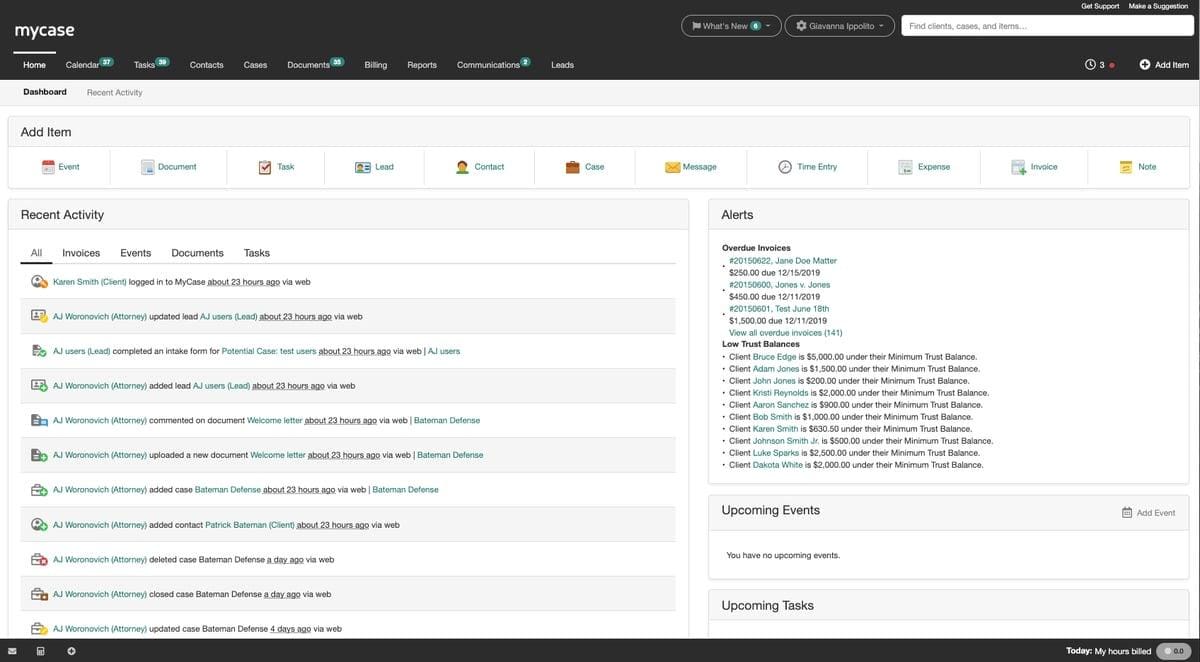
Source: G2
MyCase is especially helpful for small to mid-sized firms that want a simple way to manage client files, track time, send invoices, and communicate—all without leaving the dashboard.
Best Features
- Centralized document management: Store, share, and access files securely from anywhere.
- Built-in client portal: Clients can view documents, messages, and invoices in one place.
- Integrated time tracking: Log hours as you work and apply them directly to invoices.
- Automated billing: Create and send professional invoices with a few clicks.
Best Productivity Tools for Lawyers
Keeping everything on track gets tricky when you’re managing deadlines, documents, and daily chaos. Productivity tools help you organize work, get more done, and cut down on the back-and-forth while you handle the actual legal work.
4. Clio
Clio is legal software built to help legal professionals run their practice more efficiently. It brings together case management, billing, calendaring, and secure communication into one platform.

Source: G2
Whether you’re managing a solo practice or a midsize firm, Clio helps you cut down on routine tasks and stay organized.
Used across the legal services industry, Clio supports everything from time tracking to document storage, giving legal professionals more control over how they work. It’s a solid piece of legal technology that keeps things moving without the mess.
Best Features
- Full practice management: Keep cases, tasks, and contacts organized in one place.
- Time tracking and billing: Record hours and send invoices directly through the platform.
- Calendar and deadline tools: Stay on schedule with built-in reminders and synced calendars.
- Client messaging and file sharing: Communicate securely through the client portal.
- Cloud access: Work from anywhere, whether you’re in the office or on the go.
- Integrations with other legal tools: Works smoothly with platforms like QuickBooks, LawPay, and Zoom.
5. Microsoft Office
Microsoft Office remains one of the most widely used document management tools in the legal profession. Even with newer platforms out there, many legal departments and firms still rely on Word, Excel, Outlook, and PowerPoint to handle everyday tasks.

Source: G2
Microsoft Word is often the go-to for drafting motions, contracts, and letters. Excel helps track billable hours, manage budgets, and organize case data. Outlook keeps emails and scheduling under control.
These tools may not be flashy, but they’re reliable and familiar, which makes a big difference when you’re working under pressure.
Best Features
- Word processing for legal docs: Draft contracts, pleadings, and templates with advanced formatting.
- Spreadsheet tracking: Use Excel for time logs, budget planning, and case summaries.
- Email and calendar sync: Outlook helps manage communication and deadlines in one place.
- File sharing and storage: Store and organize case documents with OneDrive and SharePoint.
- Trusted across the industry: Common in legal departments and firms of all sizes.
- Boosts law firm efficiency: Keeps daily workflows simple and consistent across teams.
6. Zapier
Zapier is a no-code automation tool that connects your favorite apps to reduce manual work across law firm operations. It’s not legal software in the traditional sense, but it pairs perfectly with practice management software to make things run smoother behind the scenes.
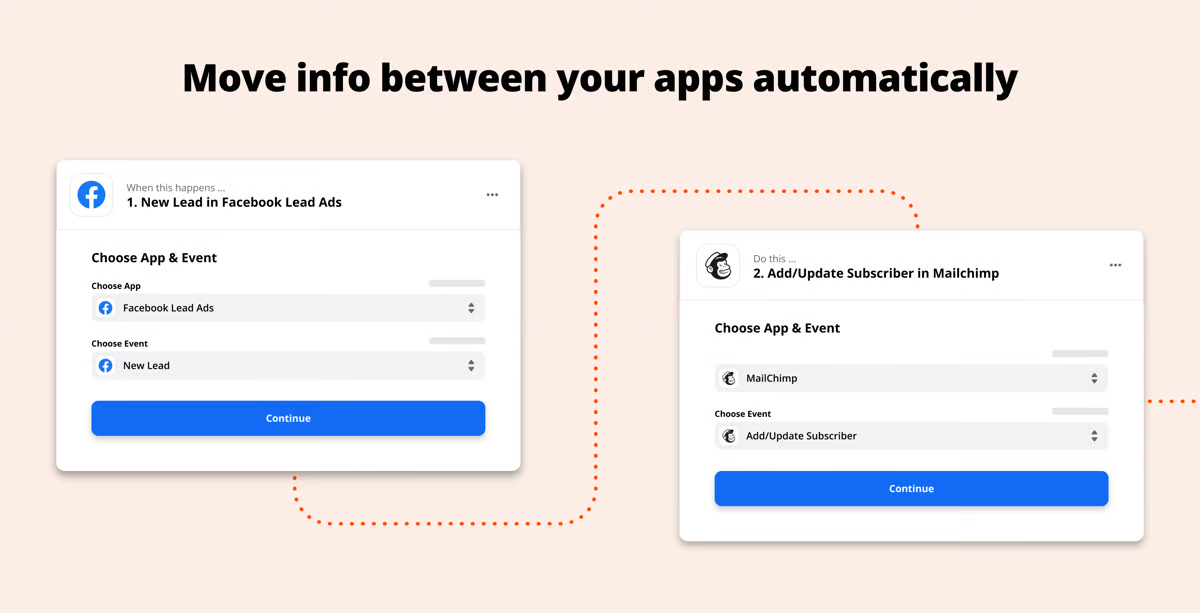
Source: G2
Legal teams can use Zapier to connect apps like Clio, Google Sheets, Outlook, and Slack. For example, you can automatically create calendar events when new tasks are added or get a Slack alert when a client fills out a form.
It’s also helpful for integrating AI tools into your workflow without needing a developer.
Best Features
- Works with legal tools: Connects with popular practice management software like Clio or MyCase.
- No-code automation: Set up workflows without writing a single line of code.
- Supports law firm operations: Handles repetitive admin tasks so your team can focus on real work.
- Customizable triggers and actions: Automate emails, reminders, and file uploads with ease.
- AI integration ready: Combine with AI tools to create smarter, faster processes.
- Ideal for legal teams: Helps streamline collaboration and task management across departments.
Best Accounting and Billing Tools for Law Firms
Staying on top of billing and finances is just as important as handling your cases. Hourly billing, flat fees, or contingency arrangements all need a system that helps track time and collect payments.
We’ve compiled some tools that can help your firm handle billing with less stress and more accuracy.
7. QuickBooks
QuickBooks is accounting software that helps law firms handle financial tasks while staying organized. It’s used across many industries, but legal professionals—especially at personal injury firms—often rely on it to manage expenses and keep their books in order.
Source: G2
QuickBooks also works well with time tracking software and other legal tools, which helps make it easier to manage everything from billable hours to payroll. For firms juggling legal tasks and financial records, this platform keeps things clear without adding extra steps.
Best Features
- Expense tracking: Categorize spending and monitor law firm expenses in real time.
- Invoicing tools: Create, send, and track professional invoices for client matters.
- Bank syncing: Connect business accounts to see accurate balances and transactions.
- Time tracking integration: Works with time tracking software for precise billing.
- Custom reports: Build financial reports for monthly reviews or audits.
- Built for flexibility: A solid fit for personal injury firms, small practices, and growing legal teams.
8. LawPay
LawPay is payment processing software built specifically for law firms. It lets you accept credit card and ACH payments while staying compliant with legal and accounting rules.
LawPay is approved by bar associations across the country, which is why it’s a trusted option for handling sensitive client data securely.

Source: G2
It integrates with multiple tools that legal professionals already use, including practice management systems and accounting software. If you’re already using such software, adding LawPay can help complete your billing setup with little to no hassle.
Best Features
- Legal-specific payment processing: Keeps operating and trust accounts separate.
- Secure handling of sensitive client data: Built to protect payment details and client trust.
- Bar-approved compliance: Meets the rules for professional conduct and trust accounting.
- Works with multiple tools: Integrates with platforms like Clio, MyCase, and QuickBooks.
- Flexible payment options: Accepts credit cards and ACH transfers with ease.
- Simple setup: Get started quickly and start receiving payments faster.
Best Communication Tools for Lawyers
Keeping everyone in the loop takes more than just email. Clients expect timely updates, your team needs quick answers, and there’s always something that needs your attention.
Take a look at these tools that can help you manage conversations and stay on top of things.
9. Slack
Slack is a messaging platform that helps legal teams communicate quickly and stay organized. Many firms use it to replace traditional methods like long email threads and scattered group texts.

Source: G2
With Slack, everything stays in one place, such as messages, files, and updates, so you can spend less time digging through inboxes.
It’s also a helpful way to access documents, share case updates, and automate routine tasks through integrations with legal tools, calendars, and AI assistants.
Best Features
- Organized channels: Create dedicated spaces for cases, departments, or projects.
- Real-time messaging: Chat with your team instantly, without clogging your inbox.
- Easy document sharing: Access documents and files right in the conversation.
- Searchable history: Find messages, attachments, and case info fast.
- Works with many tools: Integrates with calendars, task apps, and legal software.
- Supports firm workflows: Helps automate routine and complex tasks and streamline updates across your team.
10. Zoom
As you probably know by now, Zoom is a video conferencing tool that makes virtual meetings simple for law firms. It’s widely used to meet with clients, hold team check-ins, and even attend remote hearings.
Thanks to high-quality video and easy screen sharing, Zoom helps legal professionals communicate clearly and keep meetings on track.
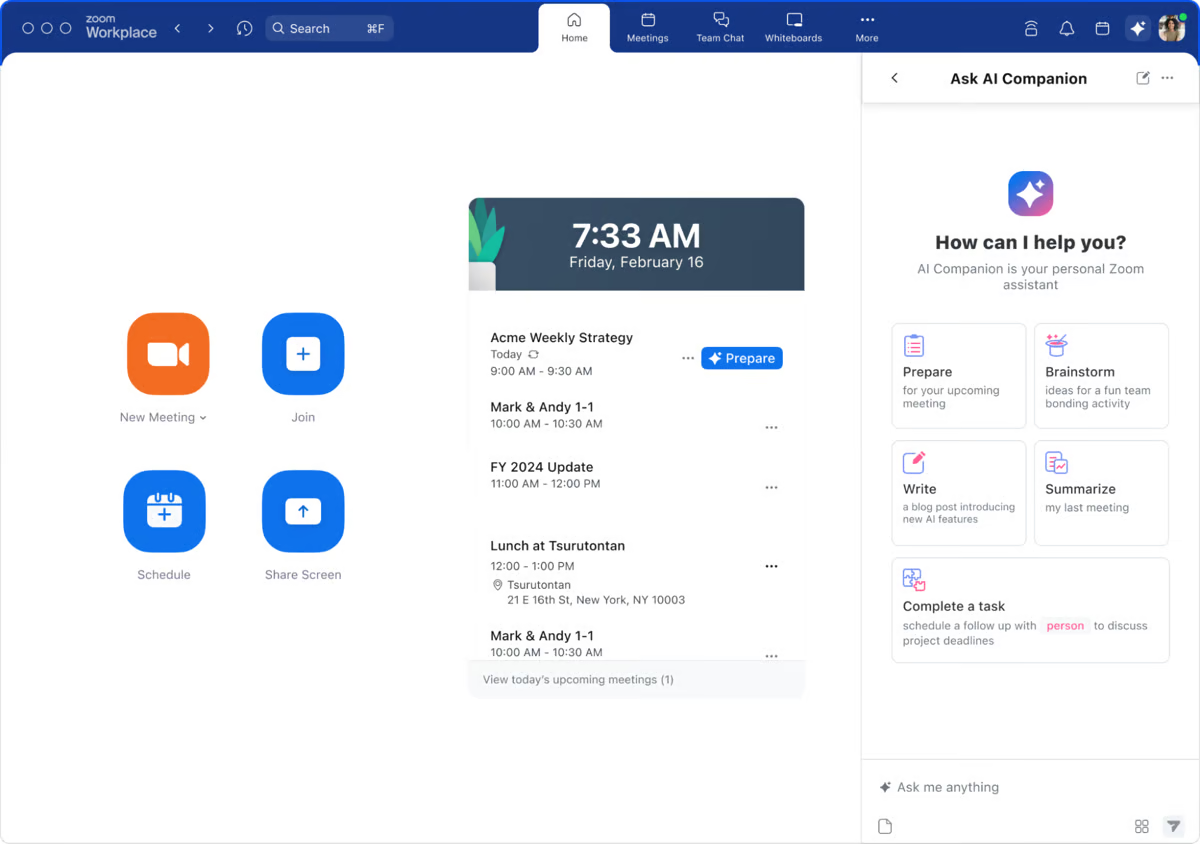
Source: G2
Using Zoom can improve productivity by cutting down on travel and scheduling delays. It also helps firms meet with more clients (no matter where they are) and streamline workflows by bringing face-to-face conversations online.
Best Features
- Reliable video meetings: Host secure, high-quality calls with clients and colleagues.
- Screen sharing: Review documents and presentations in real time.
- Meeting recordings: Save sessions for internal review or follow-up.
- Calendar integrations: Sync meetings with Outlook, Google Calendar, and more.
- Flexible scheduling: Book and join meetings from anywhere, on any device.
- Increases efficiency: Helps legal teams improve productivity and streamline client communication.
Best Legal Research Tools
Legal research can take up a big chunk of your day, especially when you’re juggling multiple cases. The right tools help you find case law, statutes, and legal opinions faster and with more accuracy. Here are a few of our suggestions:
11. CoCounsel (Casetext)
CoCounsel (formerly Casetext) is a legal research platform that helps you find relevant case law quickly and accurately. It uses AI to scan your arguments and match them with supporting cases, cutting down the time you’d usually spend digging through databases.

Source: ThomsonReuters.com
CoCounsel isn’t just a search tool. It’s built to support modern legal operations by connecting legal data, key documents, and arguments in one place. It also works alongside e-discovery tools, which can help you prepare stronger briefs with less back-and-forth.
Best Features
- AI-powered research: Analyze your writing and get case law suggestions that match your arguments.
- Search by concept: Go beyond keywords and search by legal ideas or outcomes.
- Works with key documents: Upload briefs or memos to find supporting cases instantly.
- Access to legal data: Explore statutes, regulations, and court opinions in one place.
- Supports legal operations: Speeds up research for teams working on multiple matters.
- Integrates with ediscovery tools: Helps connect research with your broader case preparation process.
12. LexisNexis
LexisNexis is one of the most well-known legal research tools used by firms, legal departments, and solo attorneys.

Source: LexisNexis.com
It gives you instant access to a massive database of case law, statutes, regulations, and legal commentary. Designed to increase productivity, it helps you find the information you need without jumping between different sources.
LexisNexis also includes AI capabilities and natural language processing, so it’s easier to search in plain English. You don’t have to think like a database; you just type your question or phrase, and it brings up relevant legal materials fast.
Best Features
- Comprehensive legal database: Access case law, statutes, and secondary sources in one place.
- Natural language search: Find legal content using everyday language instead of complex queries.
- AI capabilities: Smart filters and recommendations help you refine results quickly.
- Instant access to legal content: Search from anywhere with cloud-based tools.
- Practical guidance: Includes checklists, forms, and how-to materials for different practice areas.
- Productivity-focused tools: Built-in tools help legal teams research faster.
13. Fastcase
Fastcase is another legal research tool that gives lawyers access to a large database of case law, statutes, regulations, and court rules. It can help legal professionals find answers quickly and stay focused on the task at hand.
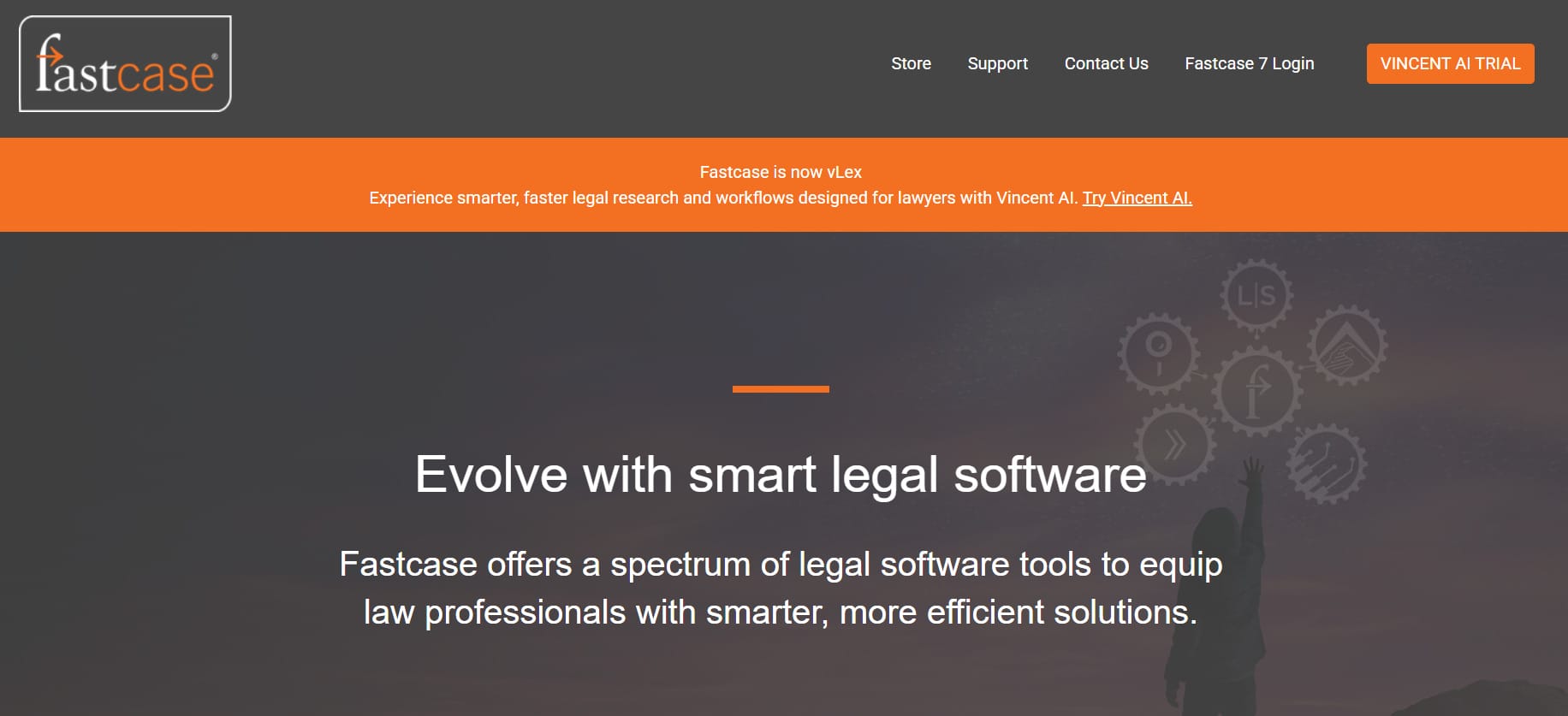
Source: Fastcase.com
Many bar associations offer Fastcase for free to their members, which makes it a smart option for solo attorneys and small firms. It’s designed with speed in mind and includes features that let you search by keyword, citation, or natural language.
Best Features
- Extensive legal database: Search case law, statutes, court rules, and more.
- Natural language search: Type in questions or phrases to find relevant results fast.
- Data visualization tools: Spot trends and citation relationships at a glance.
- Mobile app access: Use it on the go from your phone or tablet.
- Bar association access: Included with membership in many state bar organizations.
- Budget-friendly legal research: A solid alternative for firms looking to cut research costs.
Start Building Your Tech Stack With Briefpoint
Every firm has its own way of working, but the right tools can make a big difference, especially when you’re handling multiple documents, juggling deadlines, and managing client expectations. Briefpoint gives you a head start by taking care of the repetitive tasks that slow you down.

While other firms are still stuck formatting templates and typing out objections, you could already be on to the next case. Building your tech stack doesn’t have to be overwhelming. Start with one tool that makes a clear impact.
Briefpoint is that tool. Book a demo today and see how much time you can get back.
FAQs About Lawyer Tools
What kind of equipment does a lawyer use?
Lawyers rely on more than just pens and legal pads. Today’s legal professionals use a mix of digital tools to manage cases, handle billing, and reduce human error. This includes practice management software, document automation tools, secure communication platforms, and accounting systems. Many of these tools are designed to fit into existing workflows and help lawyers save valuable time on routine tasks.
What is the best legal AI tool?
The best legal AI tool depends on what you’re trying to do. For contract drafting, tools that use large language models are gaining traction for speeding up review and reducing hours spent on repetitive work. Tools like Briefpoint are designed to help with discovery responses, using AI to draft documents faster than a human can, while still keeping you in full control. These tools don’t replace lawyers but work alongside them to enhance efficiency and support due diligence.
What are the best organizational tools for lawyers?
Great organization starts with tools that can actually support the way legal professionals work. Clio, MyCase, and Microsoft Office remain top picks for keeping documents, deadlines, and case notes in order. These platforms help you gain access to everything in one place, reducing the back-and-forth and cutting down on the time wasted searching for files. When paired with tools like Zapier, they also help automate smaller steps.
The information provided on this website does not, and is not intended to, constitute legal advice; instead, all information, content, and materials available on this site are for general informational purposes only. Information on this website may not constitute the most up-to-date legal or other information.
This website contains links to other third-party websites. Such links are only for the convenience of the reader, user or browser. Readers of this website should contact their attorney to obtain advice with respect to any particular legal matter. No reader, user, or browser of this site should act or refrain from acting on the basis of information on this site without first seeking legal advice from counsel in the relevant jurisdiction. Only your individual attorney can provide assurances that the information contained herein – and your interpretation of it – is applicable or appropriate to your particular situation. Use of, and access to, this website or any of the links or resources contained within the site do not create an attorney-client relationship between the reader, user, or browser and website authors, contributors, contributing law firms, or committee members and their respective employers.
